#but I think the real explanation is that the writers were trying to mislead us
Explore tagged Tumblr posts
Text
I find it interesting that during the trials Spike endured to get his soul back, never once did we see him put on his vampire face. Which is odd, because vampires are more powerful when they do that. Spike usually puts on his vampire face when he's fighting. So why not do it during the trials, especially given that he knows they're going to be incredibly difficult, and will definitely result in his death if he doesn't pass them?
I think it has to do with the fact that what he's trying to do is to get his human soul back. He wants his human soul, so he wants to fight as a human. He feels that if he fights as a vampire, it undermines what his goal is. So even though it's more likely that he would die, he still wants to be as human as possible.
Which is one of the reasons I disagree with people who say that his goal was actually to get his chip removed. If that was his goal, he would have fought as a vampire.
#it honestly blows my mind that there are seriously people who think he was actually trying to get his chip removed#that wasn't his point#I do sort of see why they might think that given the fact that the writers decided to have him verbally be a dick about Buffy#at least until the very end#the only explanation I can see is that he was psyching himself up for the trials#but I think the real explanation is that the writers were trying to mislead us#which I get#but it's still frustrating#regardless#it's obvious that his goal was to get his soul back#buffy the vampire slayer#spike btvs#Buffy meta#spike meta#my meta#william the bloody#spuffy
23 notes
·
View notes
Text
Loki’s Line About Betraying Everyone
I need to talk about this line (spoiler: I’m not happy about it). I was going to just include this in the full episode response post I’m working on, but it got long enough that I decided to make it its own.
First of all, here’s the full quote: "I betrayed everyone who ever loved me. I betrayed my father, my brother, my home. I know what I did. And I know why I did it. And that's not who I am anymore."
Y'all, I'm less emotional about it now but this line fucked me up when I first heard it. It hit me like a ton of bricks while watching the episode for the first time because I was actually doing fine and wasn't significantly bothered by anything up until that point, and then came that line and I suddenly almost felt physically ill. I actually wrote up a post about it that night but never posted it because it was essentially just a lot of screaming, so I've now taken pieces of that and formed a hopefully more coherent post (though it still contains a good amount of screaming). So, I get that the idea that Loki’s betrayed Thor over and over is a Commonly Accepted Thing. It's really a lot more complicated than that, and there are a lot of gray areas involved, but fine, I'll give them that one. But - when did Loki betray his father? When did Loki betray his home?? I’m not just mad about it, this is...a legitimate question. I mean with the father thing, I guess the only thing could be the nursing home in Ragnarok/taking the throne from him? Which is irrelevant anyway because this Loki didn’t do that and doesn't even know it happened in the main timeline?? And besides, it PALES, like, hilariously, in comparison to any one of multiple things Odin did to him before that (not counting any fanon here - just the canon things that we know of!) I am just so confused, especially about the betraying Asgard thing. WHEN? LITERALLY WHEN? Guys, there is no film in which that took place.
If I trusted the narrative, I would say the most logical thing to conclude - at least about the betraying Asgard part - is that this is a setup for Loki to later realize he actually saved Asgard by causing Ragnarok (because that's the closest thing I can think of to "betraying his home"), which could even tie into something about, idk, helping him realize he’s capable of being a hero? (or something) and it would be a good follow-up to the moment he found out about Ragnarok in episode 2, but...fuck, the way these lines were framed it really doesn't feel like anything like that is going to happen. I could be wrong, but these just didn't strike me as lines that are at any point going to be contradicted or even revisited.
And moving onto another part of the quote - "I know why I did it." Uh, I guess good for Loki for apparently knowing that...but the audience sure doesn't?? This is something we're just now being told and have not been shown at all?? I have a feeling Loki thinks he knows why but it unfortunately doesn't have anything to do with some of the biggest actual reasons, which are the abuses done to him that helped make him who he is. Even more unfortunately, I also have a feeling the creators are on roughly the same page as Loki here. So yeah, that's a real shame.
The core problem here seems to be where the writers are coming from, and @iamanartichoke worded it really well here, so I’m just going to quote her: “either the writing is being lazy by oversimplifying Loki’s motives, or it’s being deliberately misleading in order to retcon the character, or the writers genuinely believe that’s what happened, which implies a misunderstanding of Loki’s character kinda from the get-go - at least on what drives his villainy and what fuels his anger, which are pretty significant things.” I do think there’s a slight chance they were using Loki as an unreliable narrator here and the audience was supposed to pick up on the subtext (more on that at the end of this post), but I doubt it, and I think it’s very likely one or more of the options listed in the quote.
Honestly, I can explain Loki's line about betrayal (and his general lack of acknowledgement of his own trauma/legit grievances against his family) pretty easily in-universe. It makes sense that Loki himself would frame things as him betraying everyone who's ever loved him as if they never did anything to wrong him first, or that he would try to ignore what Thanos did to him in favor of putting all the blame on himself (coping with his trauma and loss of control by denying it). Or hell, maybe he would even straight up subconsciously invent a betrayal that never even happened, like the one about his home. I can totally understand Loki seeing the events of his life that way! That all lines up with his complete lack of self-worth, and to have him 1) recognize his mistakes and take responsibility for them (which has happened at this point in the show), but then progress on to 2) realize he isn't solely to blame for literally everything, and 3) recognize the role of his family and others in understanding why he is the way he is - that would be a very satisfying arc and is the natural direction that the story should take in episode 6. The problem is, I don't think the show is going that way. I think we're either supposed to take it at face value that Loki did in fact betray everybody who ever loved him (as if Loki is a reliable narrator when he's most certainly an unreliable one), or the audience is supposed to figure out that Loki's an unreliable narrator here - but the latter won't work, because the creators have to follow through on that subtext at some point and actually do something to indicate that what Loki said wasn't 100% true, and it doesn't feel like they're going to. You can't expect your audience to put any weight on subtext or even pick up on it in the first place if you never actually confirm anything, and your audience won't know your narrator is unreliable unless you tell them. If Loki being an unreliable narrator in that specific moment was their intention, only a small subset of fans are going to pick up on it. So the way they're framing it so far, the audience is simply going to see it the same way Loki does and not realize it's incorrect.
Unfortunately, as stated earlier, I think the most likely explanation is that the writers either don’t understand Loki, are being lazy, or are deliberately retconning. So while I take a degree of comfort in the in-universe explanation, it’s pretty damn infuriating to consider where the writer’s minds were probably at in reality, and how this set of lines is presenting Loki to the casual audience.
Tagging @iamanartichoke and @delyth88 if you guys have any thoughts?
#loki series negativity#loki spoilers#loki tv series#loki meta#loki series speculation#kind of#journey into mystery
72 notes
·
View notes
Text
bridgerton--the good, the bad, the ugly
The short of it: Bridgerton excellently captures the tone of Regency romance novels and offers a lot of escapism and great sex scenes, but could definitely use some serious work in terms of how it depicts race and it should have made some further alterations to the dated and flawed source material. Definitely loved a lot of it and am hotly anticipating the second season, but I want to see more work done and I HOPE that this encourages the adaptation of better (and less inherently flawed) romance novels.
Now for the longer take.
The Good
Bridgerton depicted sex and romance in a way that is totally different from anything I’ve seen in period dramas, for sure, but possibly different from anything I’ve seen on TV. The romance of it all was woven into almost every aspect of the show. There is the handsome and seemingly severe but extravagantly wealthy and sexually adept duke sweeping into town. The (multiple) rakes who just want to have fun while also being hot messes. The awakening of female sexuality and the copious use of the female gaze. (Note the pretty modest and minimal focus on female nudity, while we get plenty of lingering shots on Simon.). People want love! There is pretty minimal violence and perhaps the most physically violent scene involves Simon beating a man up because HE IMPEACHED DAPHNE’S HONOR~.
The sex scenes themselves focused on Daphne’s pleasure for the most part, and were probably among the best I’ve seen since Outlander in terms of chemistry, in terms of the visuals, in terms of focus on sex as an act of emotional connection and FUN. Yes, there was some Unlikely Vaginal Orgasming, but we also saw Simon tell Daphne about masturbation. On the wedding night, he was pretty clearly touching her to help her enjoy it. He ate her out... a good bit.
And aside from that, we got all of the grand speeches, the stolen glances and touches, an excellent buildup of sexual tension that led to some pretty hilarious moments.
I also really enjoyed many of the performances on this show. Rege-Jean and Phoebe had great chemistry and excellent back and forth. Jonathan was a GREAT Anthony. I would argue that as lackluster as I found his relationship with Siena (more on that in a minute) it largely existed as a way to set him up for his romance with Kate. He now has even more of a reason to be down with love, as opposed to solely relying on a kind of flimsy tragic backstory. Additionally, his overprotectiveness of Daphne added tension to the story and made him a source of comedic relief for me? I loved it. Give me disaster Anthony all day; can’t wait until he falls to the enemies to lovers trope just like Simon fell to his FLAW-FREE fake dating plan.
A lot of the changes I found were really good. Obviously, it was important that the show incorporated greater diversity (though they need way more). Benedict was INFINITELY more fun and interesting than he was in the novels, and acted as another standout for me. As much as I hate Portia Featherington, I think that the elevation of her to a proper villainess is probably necessary and Polly Walker excels at those types of roles, though they need to maybe have her be less like, actively racist. I adored the addition of Queen Charlotte; she was excellent comic relief. Lady Danbury’s expanded role and relationship to Simon was one of the best moves they made. It touched my entire soul.
Buuuut....
The Bad
The show needs to work on casting more men that are frankly on Rege-Jean’s level. It feels a bit awkward to see a guy that is by most people’s standards kind of stunning and then.... Colin looks twelve. Lord Philip is like... a farm guy. Get rid of the sideburns, we’re in romance novel territory.
In the same note, the girl who played Siena wasn’t a great actress and wasn’t super stunning, so even though I’m fine with her being a placeholder.... Eh. Go for better casting. The woman playing Madame Delacroix would’ve played that role so much better and I really enjoyed her dynamic with Benedict because she was just fun.
Frankly, I don’t know what the fuck they’re going to do to make me want to watch Penelope and Colin fall in love. Their book was already a bit basic--fun, but far from revolutionary. I don’t really get why they would receive attention similar to that of Kate and Anthony, basically. The issue is that Colin, again, looks and sound rather young and twerpy. It obviously wasn’t great for him to be tricked into raising another man’s child, but.... For fuck’s sake, how much would that have affected his life on a practical level. He’d never know unless he was told, thanks to the lack of DNA tests. He was marrying far out of his league in terms of attractiveness. He’s a rich white guy in England with a supportive family.
I really disliked the fact that Colin told Marina in his huffy little tantrum that he would have married her anyway--because would you have, buddy? Really? The thing is that Marina had no way of knowing that and her entire life (and the reputations of her cousins) was on the line. She didn’t know if she could trust Colin to keep her secret. They barely knew each other. He basically came off as a whiny child and I’m fine with him staying in Greece if that’s the plan.
Penelope was just... psychotic. And that was really disappointing, because I love Nicola and would love to have loved to see the fat girl get her sexy love story. But first off, lol, it wouldn’t have been sexy because Colin was miscast. Second, she basically tried to destroy Marina’s life and that of her sisters? And herself? Because Colin? Because Colin, a guy who hasn’t even shown any amount of attraction to her at this point? Her tears, her whining, it was all too much. Penelope was dealing with a crush and Marina was dealing with the real Grown Woman issues of a child out of wedlock and as it turned out a dead lover and they were not on equal footing.
I mean, Penelope could very well make a great villainess at this point, and if done well I’d embrace it. But I do not know how the fuck they can make me interested in her love story. And the idea of her basically being launched into villainy because she was this chubby white girl obsessively jealous of a beautiful black woman...... not a great look.
The show definitely needs to explore diversity in terms of sexuality too--I don’t think it’s correct to read Benedict as straight because he still seems to be open to exploring. Once he has more screentime, I think he could totally end up being bisexual, and it’s possible that the writers were trying to feel the audience out in terms of their receptiveness to taking a straight character who has a big straight love story in the books and making him LGBT+. Eloise could also easily be a lesbian, and I’d be thrilled to see that happen. They need to do something to expand the world, and if there are 8 Bridgerton kids, all of them being straight as an arrow seems SO unlikely.
The Ugly
Obviously, the rape scene was bad and should have been written out. Simon could have gotten caught up in the moment and blown up at Daphne after he accidentally didn’t pull out in time. Men.... accidentally don’t pull out in time... a lot. That’s how babies happen. It would’ve been believable, and due to our sympathies being with Simon largely, I don’t think he would have become irredeemable if he was more at fault than Daphne.
As it was, I will say that the scene was somewhat better than it played in the books because Simon was conscious and totally sober, and it was a bit? Confusing? That he didn’t just roll Daphne over and pull out? Because she wasn’t really clearly trying as hard as she was in the book to wrap her legs around him and hold him tight. But it remained a rape scene. The show also did a better job, I think, of establishing how fucked up it was that Simon took advantage of Daphne’s lack of knowledge. Whatever he said about thinking she knew what was up--he knew she didn’t even know about masturbation. He had to know she wouldn’t understand what pulling out meant. He did very clearly mislead her to think that he was sterile and therefore denied Daphne her ability to give informed consent. Did that justify what Daphne did? Nope. Two wrongs don’t make a right. But both of them did a fucked up thing and I think that we honestly could’ve stopped at Simon’s misleading.
The issue too is that this leads into a bigger problem the show had. It wanted to include diversity (yay!) but did not consider the total implications of what was happening (not yay). Daphne and Simon’s dynamic is inevitably influenced by the fact that she’s a white woman and he’s a black man, regardless of whatever handwaves happened. This influences the sexual assault and makes it even more messy.
Speaking of mess, I’m not sure what exactly would have fixed the “we don’t want this to be a colorblind casting” issue... but the explanation they came up with wasn’t good. Never mind that this makes everything SUPER confusing (racism is over like..... maybe 50 years MAX after Queen Charlotte’s marriage if we assume she was a teen when she married and is in her 60s now?) but Lady Danbury’s dialogue explaining this was HORRENDOUS. “One of them fell in love with one of us”. The implications are awful. I don’t know if perhaps setting back the integration of society centuries earlier would have helped? But this wasn’t it.
Additionally, the writers and casting directors didn’t seem to get that diversity is all well and good, but what about the fact that almost every black character has a light skin tone? Why are there so few black female characters? Why is Marina, the most prominent woc on the show, given the “pregnant and desperately trying to trick a man into marrying her until her jealous white cousin fucks her life up and she is humiliated into settling for a loveless match” plot? I desperately hope we see her next season, falling in love with Sir Phillip or perhaps having experienced a plot twist that gives her someone else... And she better not die. Eloise can find someone else if Marina really ends up with Sir Philip.
Ultimately, again, I really loved the show. But it needs to work on some things. I think that a lot of its issues can be addressed and fixed in a future season, and I HOPE they do that.
162 notes
·
View notes
Text
The Ketsueki brothers theory time!
All right, so this one will be based on the recent datamine. I usually don’t like to write theories using only datamine, but I have to say, I’m pretty excited about this one, and I don’t think I can wait until the chapter is released. Anyway, I’m letting you know that I will mention one possibly important piece of information, but I’ll try not to tell too much about the situation when we learn it, not to spoil too much.
Now, without further ado, let’s dive in.
In one of the future chapters, we’ll learn that Jacob was repeating the words: “Ryu, Chinese Fireball, dragon claw”. However, due to the circumstances, we can’t learn from him what it means, and so it becomes a mystery for MC to solve. Now, “Ryu” is what got me interested in particular. This is what I found:
Ryū (龍, 竜, 隆, りゅう, リュウ, Ryū) is a Japanese masculine given name and family name meaning "dragon".
And I thought… what are the odds that the Wizard in White’s real name is:
RYU KETSUEKI?
I mean, it’d totally explain why his name wasn’t revealed yet, right? But wait! I have more!
Let’s go back to Y5. In Y5Ch6, we had this scene:
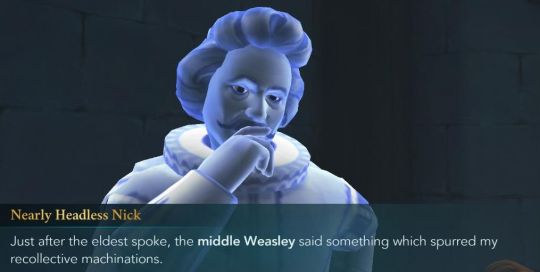
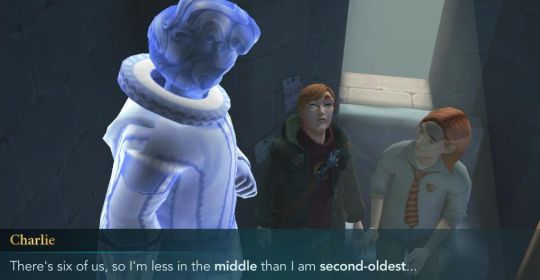
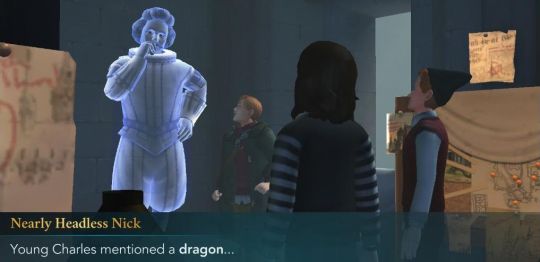

Frankly, I always felt that Nick’s words here were supposed to be misleading – that Jacob was using “dragon” as a nickname or something. And I did in fact believe that it might’ve been about the WIW. The thing was that I based my speculation on his tattoo:
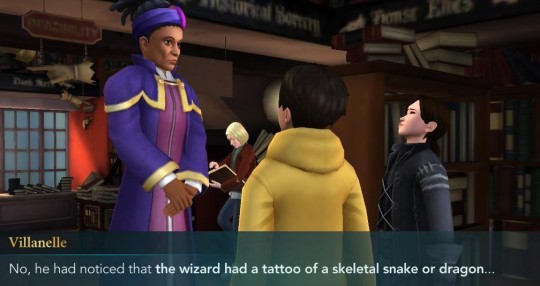
But to be honest, I kind of abandoned this idea. I mean, there was no follow up whatsoever, so I assumed that either the writers forgot about it or that it was indeed about a dragon in the Portrait Vault.
But now, with that name… It all adds up quite nicely. Like, let’s say that a dragon is an emblem of the Ketsueki family – hence the tattoo. Also, let’s say that the eldest son is always named Ryu, for example. That being said, since Jacob believed that “a dragon” is at Hogwarts, perhaps it wasn’t even exactly about the WIW – it was about Victor. But why Jacob would be interested in Victor? Or in the WIW, for that matter? Well, it brings me to my second realisation.
A while ago, I proposed the idea that R might’ve used Victor’s vampirism to lure WIW into joining them; that they promised him that they can cure Victor. But it only explains how they did it. I still had no idea WHY would they do it. And then, it hit me: R thought that the WIW might be Jacob. Well, not literally, of course.
I often talk about how the siblings have to be connected to the Cursed Vaults and necessary to open the final one. I think of it as their curse which was carried through generations. I believe that their family moved abroad at some point as well – that’s why R had troubles with finding them and why nothing was happening with the Cursed Vaults until Jacob appeared. So, what if R’s search led them to the WIW somehow? What if for some reason, they thought he can open the final Vault? What if they’re responsible for his expulsion, just like for Jacob’s, and that it was supposed to force him to join them (so Victor could’ve been simply an additional motivation)? And maybe, just maybe… there was some prophecy involved with that?
Now, why would I put the prophecy into all of that? Well, mostly because I don’t see any other explanation for this part from R’s letter they wrote to Jacob after Duncan’s death (Y5Ch7):
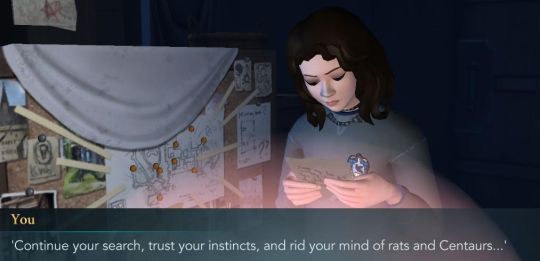
The first time when I thought it might have something to do with any kind of prophecy was when we had the class on Myomancy in the game, which is a form of Divination using rats and mice. So, y’know, the rats part is pretty obvious. As for Centaurs, they do specialise in Divination, right? After all, even MC went to them for help in that matter. Therefore, maybe Jacob had a similar intention? But I still wasn’t convinced about those rats… So, maybe it’s about different kind of rats? Like… “traitors”?
Here’s my wild guess. There was the prophecy, and both Jacob and the WIW seemed to fit it. I assume that the WIW might’ve been recruited first, but then, R realised that he’s not the right person. Perhaps they even withdraw their offer of helping Victor. But even if not, the WIW rebelled against R and somehow betrayed them. Or not even, but that’s R’s version of the story.
When R was working on Jacob already, he somehow learnt about the prophecy and about the WIW. He wanted to find him, or find his brother. He also wanted to go to Centaurs with the prophecy, even though he probably was already in a bad relationship with Torvus.
R found out that he’s investigating it, and they didn’t like it because it could mean that Jacob would discover too much. After Duncan’s death, when R was also trying to be nicer to Jacob, they told him not to think about “rats and Centaurs” – where “rats” refers to the WIW, who R portrayed as a traitor or something. I know they used a plural form, but I think it still makes sense as a generalization. Alternatively, they might also be talking about Rakepick (as Jacob was likely working with her at the time, too, and R probably wasn’t happy about it either).
Also, it might even fit the Rogues theory. It’d explain why the WIW wants revenge on R, and why he’d join the Rogues who secretly work against R.
So… yeah! I guess that’s it! As always, I don’t expect that Jam City will explain things in such detail. I really doubt that we’re gonna return at all to the plot of Jacob believing there’s a dragon at Hogwarts. But if it at least turns out that the WIW’s name is Ryu Ketsueki… I’m gonna be very happy.
#long post#hogwarts mystery#hphm#wizard in white#victor ketsueki#hphm jacob#hphm r#the ketsueki brothers theory#analysis post#theory#hphm theory
24 notes
·
View notes
Text
The Dos and Don’ts of Writing Smart Characters
Since I started this blog, one of the most common questions I’ve received has to do with the portrayal of intelligent characters. This is also one of the most difficult to answer -- excluding questions about characters with specialized knowledge sets, which are fairly easy to answer with source compilations. Most of the questions have to do with: how do you portray a smart character believably? How do you make the audience relate to them? Can I still make them likable? How do I avoid the pitfalls of popular media?
Well, I’m finally here to answer, utilizing examples from some of my favorite (and occasionally, not-so-favorite) media. Let’s jump in to the dos and don’ts of smart characters!
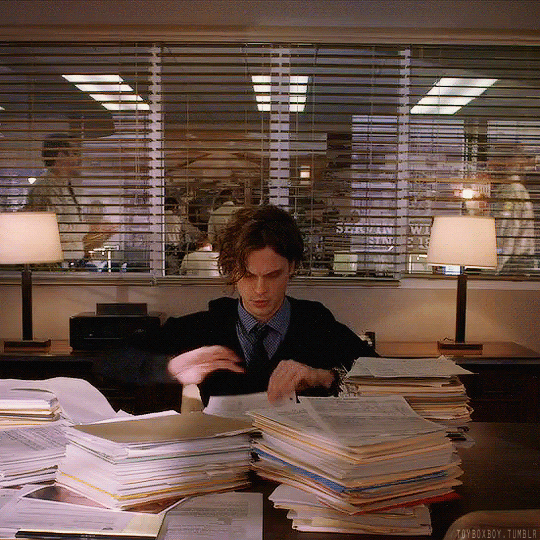
1. Do let the audience follow the character’s thought process.
As demonstrated by: Tommy Shelby from Peaky Blinders
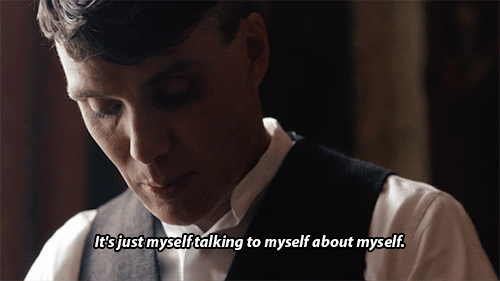
Albert Einstein allegedly once said, “If you can’t explain it to a five-year-old, you don’t truly understand it.” And the sentiment rings true: true genius doesn’t need to dazzle with big words and technobabble. Instead, it makes the complex appear simple.
The same rings true for brilliant characters. BBC’s Sherlock (more on that later) ceased to satisfy in its later seasons because it began to rely too heavily on visual glitz to avoid actually explaining its mysteries and how they were solved. Similarly, the biggest complaints with block buster franchises -- Star Wars, The Avengers, Game of Thrones -- is that they became obsessed with “subverting expectations” cleverly instead of leading the audiences to their most logical and satisfying conclusions.
Meanwhile, the smartest and most satisfying media dazzles not by staying over the audience’s head, but by illustrating how simplistic the solutions can be.
Let’s start with my boy Tommy Shelby, the charismatic, swaggering protagonist of the charismatic, swaggering crime drama Peaky Blinders. Using only his intelligence (and complete disregard for his own life/suicidal tendencies, but that’s not the point here), Tommy claws his way up from the near-bottom of the social ladder (an impoverished Romani in early 20th century Birmingham) to being a decorated war hero, to being the leader of a feared razor gang, to dominating the race track business, to becoming a business mogul, to becoming a member of parliament and trying to assassinate the leader of the fascist party. He’s also one of the paramount reasons why I’m bisexual.
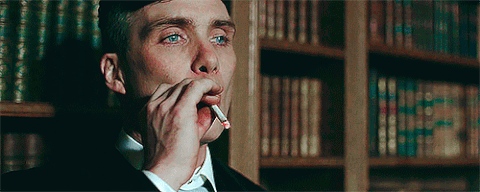
So how can such a drastic social climb be conveyed believably? Because Tommy -- as the viewpoint character -- is placed in seemingly inescapable situations, and then proceeds to demonstrate that the solutions to those situations have been there the whole time. I recently watched a brilliant video on how this is done, which can be viewed here.
Early in season one, for example, he responds to aggressive new methods by the police by organizing a mass-burning of paintings of the king, and uses the press this garners to publicly shame the methods of the chief inspector who’s been antagonizing him. In the next season, he talks his way into a deal by bluffing that he planted a grenade in his rival’s distillery. My personal favorite is in season four, when he responds to being outgunned by a larger, American gang by contacting their rival -- none other than an Alphonse Capone.
All of Tommy’s victories are satisfying, because they don’t come out of nowhere -- we have access to the same information he does, each victory is carefully foreshadowed, and we are reminded at every turn that failure is a very real possibility (more on that later.) So when he wins, we’re cheering with him.
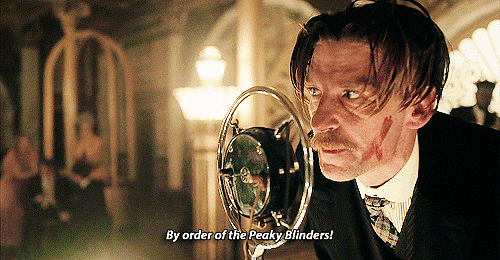
Other examples: Mark Watney from The Martian, who explains science in its most simplistic terms and with infectious enthusiasm. He would make every character on The Big Bang Theory cry.
Also, Miss Fisher from the AMAZING Miss Fisher’s Murder Mysteries. The dazzling, 1920s, female Sherlock Holmes of your dreams. I cannot recommend it enough.
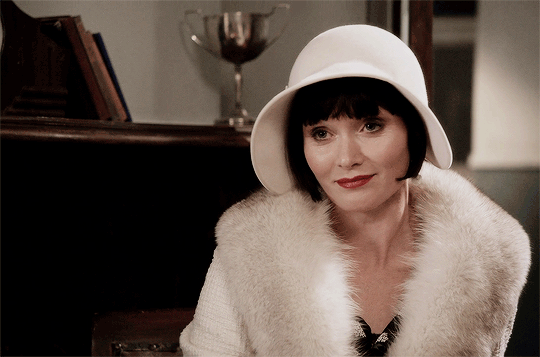
To apply this to your own writing: Remember you won’t dazzle anyone if you smack them in the face with a “brilliant” plot twist. They want to take a journey with your character, not be left in the dust.
Also, for everyone in my askbox concerned that they’re not smart enough to write intelligent characters, just remember how simple the problems confronting smart characters can be. Put them in a difficult situation, and provide them with a means of getting out. Then, just let them find it.
2. Don’t assume the audience is too stupid to keep up (or try to make them feel too stupid to keep up.)
As demonstrated by: Sherlock Holmes from BBC’s Sherlock.
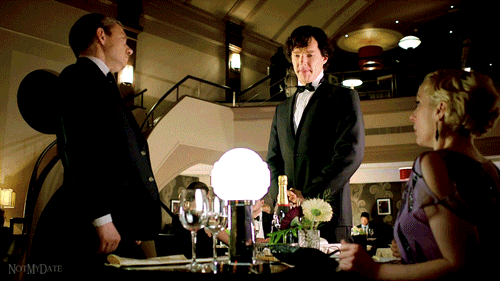
Say what you will: there were reasons why everyone was so captivated by this show during its first two seasons. It felt fresh. People had yet to become frustrated with the inescapable thirst for Benedict Cumberbatch. The writing was sharp, and the editing clever. And it wove a tantalizing web of mysteries that demanded solution. The problem was, there weren’t any.
The most frustrating for many was how Sherlock faked his death at the end of season two, after which devoted fans spent two years creating intricate theories on how he might have pulled this off. The creators responded by mocking this dedication in the opening episode of season three, by showing a fan club spinning outlandish theories (one of which included Sherlock and Moriarty kissing.) This might have been laughed off -- at the time, many seemed to consider it quite funny -- if the creators had bothered to offer their own explanation of how Sherlock survived. They didn’t. And so began a seemingly endless loop of huge cliffhangers that promised -- and consistently failed to deliver -- satisfying answers.
The most egregious examples occur in season four, which provided answers to questions no one asked, and withheld answers for things everyone wanted to know. For example, did you know that the real reason Moriarty engaged Sherlock is because he was hypnotized by Sherlock’s secret evil sister? The same one who killed Sherlock’s best friend, whom Sherlock convinced himself was a dog? Yes, that was a real plot point, in the climax of the series. It’s an effort to befuddle the audience with brilliant and unexpected writing, but instead pulled them out of a story they were already invested in and made them far more critical of its pre-existing faults.
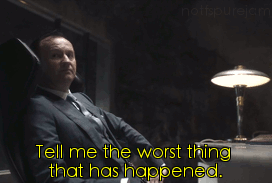
It’s pointed out in the brilliant (if bluntly named) Sherlock Is Garbage, And Here’s Why that Moffat can be a great writer, but is a consistently terrible show runner, because he’s more interested in dazzling the audience with cleverness than actually telling a satisfying story. The video also points out that the show often implied Sherlock’s brilliance, without ever letting the audience follow along with his actions or thought-process in a way that DEMONSTRATED his brilliance.
I highly recommend giving the aforementioned video a watch, because it is not only a great explanation of how Sherlock Holmes can be best utilized, but about how writing itself can be best utilized.
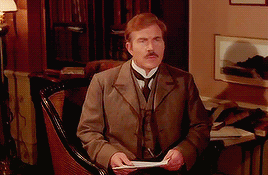
Other examples: The Big Bang Theory. As Wisecrack points out in their wonderful video on the subject, the punchline of every joke is “oh look, these characters are smart nerds!” which is repetitious at best and downright insulting at worst.
How to avoid this in your writing: Treat the audience as your equal. You’re not trying to bedazzle them, you’re trying to take them on a journey with you. Let them be delighted when you are. Don’t constantly try to mislead them or hold intelligence over their head, and they will love you for it. Also, cheap tricks do not yield a satisfying story: readers will know when you went into a narrative without a plan, and they won’t appreciate it.
3. Do remember that smart people can be kind and optimistic!
As demonstrated by: Shuri from Black Panther.
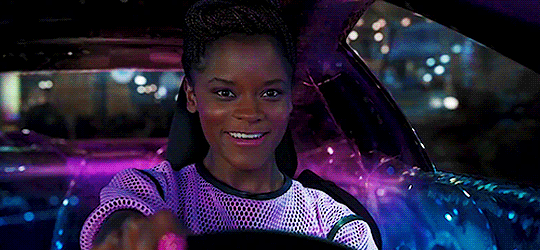
Yes, brilliant people can be unhappy and isolated by their intelligence, or rejected by society. But remember that intelligence isn’t synonymous with a cantankerous attitude, or an excuse to be a pugnacious ass to those around you!
Part of the reason why Shuri of 2018′s Black Panther was such a breath of fresh air was the fact that she subverted almost all preconceptions about how a genius looks, acts, and regards the world. And it’s not just the fact that she isn’t a sullen, middle-aged white man that makes her stand out: Shuri has an effervescent attitude, and genuinely loves contributing to her country and family. She referred to sound-proof boots as “sneakers” (and then explained the pun when her brother didn’t get it.) She’s fashionable. She teases her older brother, and cries when he is apparently killed. She’s up on meme culture. This makes her unlike pretty much every other genius portrayed in the MCU.
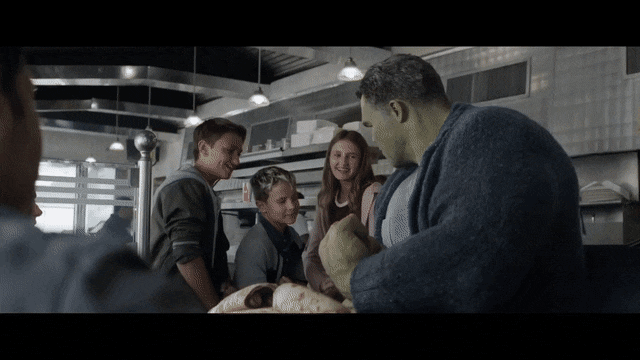
Except maybe the Hulk. He can dab now.
Shuri is also allowed to take pride in her genius, and can be a bit insufferable about it, which makes her more enjoyable and rounded. But she is an excellent example of how genius can be explored and portrayed in fiction, and I will forever be embittered that she was underutilized in Infinity War and Endgame.
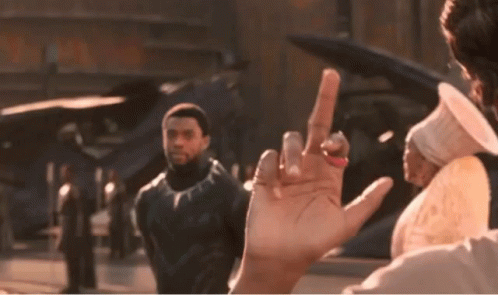
Why, for example, are all geniuses portrayed as arrogant misanthropes? Albert Einstein battled depression, but he is also said to have enjoyed blowing bubbles and watching puppet shows. He was kind to those who knew him. Similarly, Alan Turing behaved little like his fictional counterpart, described as “shy but outgoing,” with a love of being outdoors. Nikola Tesla fell in love with a pigeon. Why do we have to portray these people so damn gravely?
Other examples: Spencer Reid from Criminal Minds. Also an excellent portrayal of an intelligent person on the autism spectrum, as he struggles to interface socially but cares profusely for his fellow human beings. He is brilliant, and completely precious.
Also, Sherlock Holmes -- the original version, and all faithful adaptations thereof. Anyone who thinks Sherlock is an austere, antisocial jerk isn’t familiar with the original canon. He blushed when Watson complimented his intelligence, for God’s sake.
Then there’s Elle Woods from Legally Blonde and Marge from Fargo. Brilliant, upbeat, optimistic geniuses.
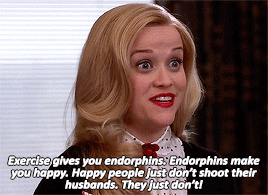
To apply this to your own writing: If you have a smart character who hates everyone around them for no identifiable reason, ask yourself why this is necessary and what this adds to the plot. Are they angry about injustice, towards themselves or others? Are they frustrated with an inability to relate to people? Do they want to protect themselves or their family at all costs, including politeness? If not, question why your brilliant character can’t also be kind to those around them.
4. Don’t make your character perfect at everything they do.
As demonstrated by: Wesley Crusher from Star Trek: The Next Generation.
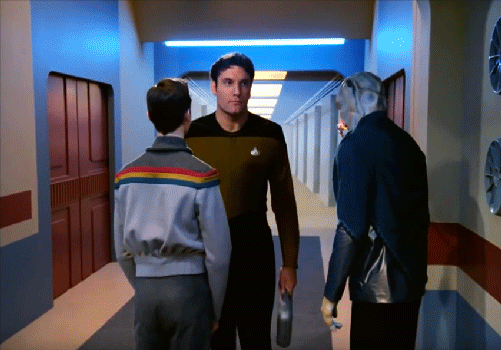
Ah, Wesley. Some call him the original Mary Sue, and it’s one of the only times I’ve seen the term applied with some accuracy. He is somehow the most gifted and least qualified person on The Enterprise. He’s Hermione Granger without the charm, jumping in to answer questions before any of the trained officers in the room have the chance to, always in the right. His only obstacle? Why, the boorish adults he’s surrounded with simply don’t understand his brilliance!
As early as the series’ very second episode, Wesley -- inebriated by an alien illness -- forcibly takes over the ship from Captain Picard, only to later save it from a threat with a reverse tractor beam of his own design.
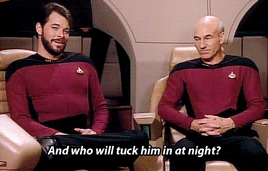
Wesley was obviously inserted as a means of attracting younger viewers, but failed egregiously, because he was too annoyingly perfect for kids to relate too, and not cool enough for them to be invested in. I binge-watched the various Star Trek series in my youth for Spock, Data, and my wife Seven of Nine, not to watch seasoned military and scientific officers get lectured by an adolescent. Even Wil Wheaton, who had the misfortune of portraying this character, expressed a dislike for him.
Precocious children are great, if you get them right. But get them wrong, and they can easily become your most annoying character, marring the face of otherwise great media. The most important thing you can do for a brilliant character is endow them with weaknesses and flaws -- even something as small as Shuri’s fondness for teasing her older brother made her enjoyable, as anyone with siblings could relate to their dynamic.
But, what if you want a supernaturally talented character who not only fails to be a ray of sunshine, but is something of an arrogant, antisocial jerk? Can they still work, especially if they also happen to be a child?
Yes, under one extremely important condition:
5. Do keep your characters out of their depth!
As demonstrated by: Number Five from Umbrella Academy.
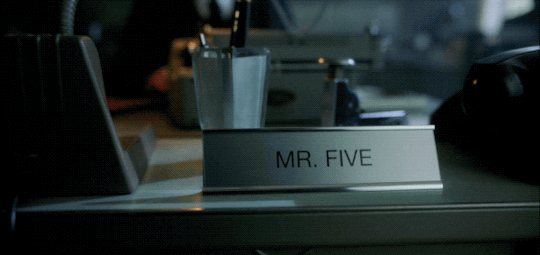
Okay, he’s not exactly a child. He’s a fifty-eight-year-old trapped in a child’s body, who’s traveled back in time from a post-apocalyptic future to warn his siblings of an incoming Armageddon. In other news, Umbrella Academy is a weird show. Unlike the comics, however, the apes don’t engage in prostitution.
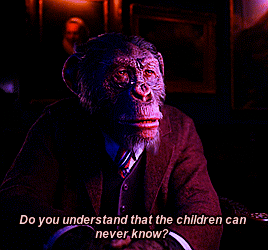
The effect, however, remains the same: a preternaturally talented child who talks down to everyone around him, including his (apparently) older siblings. So why does he work while Wesley fails so egregiously?
For one thing, it’s demonstrated early on that Five has the skills to back up his sanctimonious attitude, with the delightfully ultraviolent Istanbul (Not Constantinople) sequence. It also helps that he lacks Wesley’s squeaky-clean moral code, to the point at which he can get drunk in public or kill without remorse.
But: the element most vital to his success as a character is the fact that he’s kept completely, and consistently, out of his depth. He knows the world will end in eight days, but he doesn’t know how this will transpire or how to stop it. Ultimately, he fails again to stop the apocalypse, and must travel back in time with his siblings for another chance.
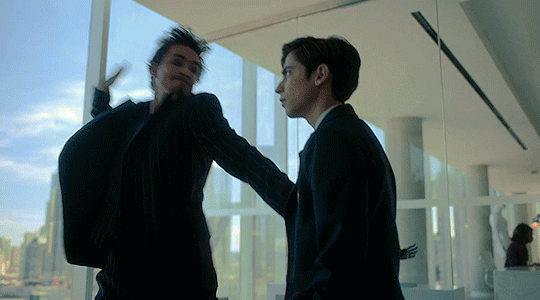
Most authors have the impulse to demonstrate a character’s brilliance by allowing them to succeed against insurmountable odds, but the Umbrella Academy writers show tremendous wisdom in allowing Five to fail. This allows the audience to empathize with him, and countermands the effects of his arrogant attitude.
This advice isn’t just true for pint-sized prodigies. Look back over this list, and take notes of how often the most successful characters are allowed to fail, to have flaws, and to ascend past their comfort zone.
Other examples: Virtually every successful example on this list.
Tommy Shelby, a character of limitless ambition, conducts a new, perilous climb outside of his social rank each season, which almost always puts him in positions of mortal danger. He faces threats both external (rival gangs, evil priests, and rising fascists) and internal (hello PTSD, suicidal tendencies, and crippling addiction) but either way, we understand that his fast-paced climb is not for the weak-willed or faint-hearted.
Mark Watney is a brilliant scientist who has been stranded in an utterly impossible situation for which absolutely no one could be adequately prepared (spoilers: it’s on Mars.) We are drawn in by his plight, and how he could possibly escape from it, and there we come to admire him for his courage, optimism, and humor.
Shuri, though not the main character of Black Panther, is allowed to show off both tremendous gifts and vulnerability, as she is powerless to stop the apparent death of her beloved older brother. She watches Wakanda’s takeover both as an innovator and a young woman, and a large reason for her success is that she is allowed to be both.
How to apply this to your writing: When portraying intelligent characters, take stock of how often they fail, their level of control over their surroundings, their vulnerability, and their flaws. We don’t want to read about flawless deities. We want to read about characters who embody and personify our humanity. So remember they need to fall down in order to pull themselves up.
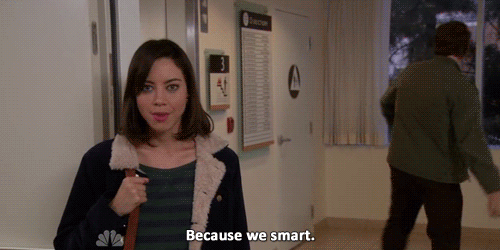
Happy writing, everybody!
#long post for ts#writing tips#writing smart characters#peaky blinders#tommy shelby#mark watney#the martian#miss fisher's murder mysteries#shuri#black panther#spencer reid#criminal minds#legally blonde#fargo#number five#the umbrella academy#star trek#star trek: the next generation
924 notes
·
View notes
Text
I've been enjoying the Time Lord Victorious series so far, and since I caught up with a lot of it recently and we’re about half-way through it, I thought I'd post a bunch of thoughts on it here together.

I’m fascinated by the idea of a Doctor Who series made up of lots of different interconnected media, which feels like a natural thing to do when you consider how much history the franchise has with so many different formats of storytelling. And it’s wild to me that, contrary to what I first assumed, it was actually conceived before the whole global pandemic thing happened; it felt like almost perfect timing to give Doctor Who fans something to think about during lockdown.
One of the series’ greatest shortcomings was its promotion, which seemed to consist entirely of the title and that one promo visual. The lack of a clear, simple, all-encompassing premise from the start means that I still see fans reacting to TLV with confusion. Using ‘Time Lord Victorious’ as the only promotion also feels a little misleading - I think many people imagined the series being an Evil Ten AU (similar to the timeline glimpsed in the Four Doctors comic), when really most of the content is either building up to that or just tangentially connected to it. On the other hand, the series was clearly lovingly designed for Who fans (who are all about piecing together timelines and consuming a large range of stories) instead of a wider audience, so the unclear promotion feels more like a miscalculation than a fatal error.
Defender of the Daleks: Titan’s comic is easily the weakest link of the series for me- it didn’t have a meaningful part of the series to fill, I was bothered by a lot of the page layouts, and it felt like a lot of it was made only for Dalek superfans. Well, I genuinely hope the Dalek superfans enjoyed it.
Monstrous Beauty: It’s really nice to see BBC give Nine some love in the series, and you can tell writers like Scott Gray and Steve Cole enjoyed writing for him and Rose. The extreme gothic aesthetic for the Dark Times, the Great Vampires, and the coffin ship is lots of fun, even if the story itself is a little straight-forward and meandering. Rassilon turning up felt very unnessecary to me, at this point I wish authors would leave the Time Lords’ founders alone unless they have something genuinely interesting to add. Admittedly, seeing the Cucurbites return and Nine make an explicit reference to the ‘90s Eight comics made my day. Y’all know I’m an Eight comics nerd.
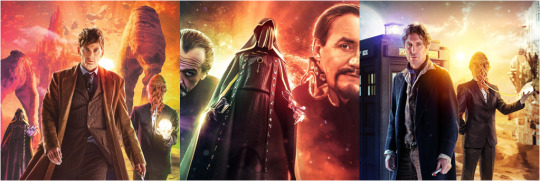
Master Thief/Lesser Evils: Honestly, both of these stories left me a little confused to what actually happened in them, and what the point of them were. The first one didn’t even seem to tie in to TLV at all. Despite that, I’m really happy to see the Delgado Master and Ainley Master get some audios to themselves. Both characters were captured wonderfully by the stories and were a joy to listen to.
He Kills Me, He Kills Me Not: I was really surprised by this just being an out-and-out Western, but I loved it! Brian sticking close to his hostage while the other characters slowly pieced together what was going on and what they should do about it made for a very different kind of tension to the usual Who story. Brian’s explanation about killing with a thought made me properly nervous about him being around any other characters. I’m glad they got to do some non-formulaic stuff with Eight before the Daleks turned up at the end. Overall, the Daleks have a larger part in TLV than I’m happy with, since it makes it feel like the series is split between experimenting with new ideas and retreading old ground.
The Knight, The Fool and The Dead: The novels are definitely the heart of the Time Lord Victorious story, and so I’m very happy with the choice of authors for them. This first one was great. I really liked Ten’s characterisation of being at his limit but trying to continue on as normal and do what’s right.
His temporary companion Brian the Ood Assassin is every bit as fun as the concept sounds. I love how Brian doesn’t (usually) try to hide that he’s a merciless murder, but is still very polite and dresses in a tux. The little descriptions of him commanding a space fleet of mercenaries like a headwaiter running an expensive restaurant are hilarious. I can’t wait for more stories with him.
The villains of the piece, the Kotturuh, are surprisingly and delightfully eldritch, with their tentacles and their symbols in the sky. Not to mention their plans for the universe written on the cave walls of the planet that acts as a gateway between their cosmos and ours, writing which make people who look at it go mad. The Kotturuh, or Kotts, spread the effects of a natural lifespan to every species in the universe, ending an era of immortality for most of them.
This leads me to the heart of the story, and the premise of the series as a whole; is the Doctor doing the right thing by trying to stopping natural death from spreading in the Dark Times? But there’s a problem here. The concept of death being unnatural is one that TLV introduces to the Doctor Who universe without warning or really giving you space to process it. If all death by old age is something artificially added to the universe, and isn’t a natural part of life and change (as has been part of the heart of basically every other Who story), then is it really wrong to oppose that? Surely that would make the Kotts the uncontested biggest mass murderers in the history of everything. It feels like we need to develop a whole new moral compass just to reckon with this. And it doesn’t help that the other side of the argument is about if it’s right to change time, something the Who franchise has never been super consistent about and another thing that we don’t have morality established to deal with in the real world.
It feels like far too complex a set-up to be explored in just two short novels and a collection of tie-ins more interested in Daleks and Ood than the Time Lord Victorious himself. I’m a little worried that the moral question will be boiled down to the ‘killing is inconceivable even in the face of genocide’ stance that the franchise has held before, and practically never handled well. But needless to say, I’m very interested in what will happen in the future stories, especially second novel and series finale All Flesh Is Grass.
#Time Lord Victorious#Tenth Doctor#Ninth Doctor#Eighth Doctor#Daleks#my posts#my thoughts#I hope the read more works#also sorry if there's any mistakes or bad wording. It's past midnight whoops#Yknow maybe I should get a real blog and not a tumblr one for this kind of thing#Ten#Brian#Nine#Rose#Eight#Master
37 notes
·
View notes
Text
Thoughts on Wandavision
Spoilers duh.
I started this out as a boredom watch as in eh why not. I was not really invested until Evan Peters showed up. Evan Peters aka the guy who played quicksilver in the X-men fox universe. With DoFP being my favorite partially because of quicksilver. So naturally I became way more invested in the show, not only that but I became hyper-fixated on X-men as a result.
So marvel brings in this actor and all the fans of the X-men are like yeah duh that makes sense, especially considering Wanda is heavily involved with MoM, the movie about the freakin multiverse. So fans of X-men and doctor strange (of which I am both) become exited for the possibilities that this opens up. Excitement builds and as a result people end up watching more content on Disney+ whether it be the movies shows ect.
And then they go and say nope it’s not. And even if they do retcon it it’s still a really crappy thing to have done. And what do I mean, this is part of marvel trying to surprise fans through subverting expectations. And yes sometimes it’s nice, but other times you end up with a mess that leaves more questions than answers.
Take Endgame and Infinity war. Now I knew that Thanos was going to win in infinity war. It was a matter of how he would win. But part of my issue with infinity war is that it felt like it barely spent time exploring how the different characters would interact with each other because there were too many and it would have blocked the narrative from moving forward. Endgame had a similar issue but on top of that they were so focused on keeping everything locked up that it didn’t exactly feel like a cohesive movie. And as a result the character interactions and relationships fell quite short. Not only that but some of them made no sense, but taking a look at endgames flaws has happened enough.
So taking a look at wandavision I’m not upset that my therory is incorrect. I’m upset that one they literally did this to subvert expectations because they hate when their shows are predictable, and two people are rubbing it in our faces that we were wrong and we shouldn’t be upset because it was a theory. And what’s more is that they had an example of fans being correct and it was still surprising.
My mouth still dropped at the reveal that it was Agatha. I still was surprised even though I knew it was coming. I know a lot of people were. And I can say it was because of the fact that we got it right that we knew where it was going and it was executed in a way that still made it feel like a big reveal. So why then are they trying to surprise the fans with well it was Ralph duh haha got you.
Because for some reason marvel hates when people can predict something. Which makes me wonder why they went with the infinity war storyline and are seemingly going with the Skrull storyline if they don’t want fans to predict what’s happening? Why are they going with well known storylines from the comics if they don’t want anyone to guess what is happening? Especially if the fans know the storylines and end up becoming disappointed if you don’t include this one specific moment.
And this is an issue because it sets up fans to know how something will play out, then turning around to subvert expectations ending up with something that doesn’t quite make sense with the narrative they had set up and teased and the characters. It doesn’t work to take pre established stories and adapt them to the screen while trying to subvert expectations. You need to pick one or the other, you simply can not do both.
There’s a reason that people are so finicky when adaptations of books are brought to the screen. It’s because they enjoy those stories and they want to see it as close up on the screen as possible. They want to see how they imagine it. And yes it’s tricky because people imagine it many different ways, but with comics honestly you have a story board right there. And yes you will need to change certain things especially to fit in the budget and physics of real life. Not to mention erase some of the problematic social injustices found in the earlier comics.
And yes wandavision isn’t based on one comic story line. But that doesn’t mean it doesn’t have to be predictable. Take a look at some other examples that I can think of that either were predictable and good or subverted expectations in a positive way that didn’t confuse people.
Mandalorian: Luke Skywalker being brought in was a surprise. We knew that a Jedi might come, in fact it seemed quite likely that a Jedi would come to train Grogu. But the thing was we didn’t know who, we didn’t know if it would be Luke or another Jedi. Potentially it could have been one we hadn’t met, but we knew that one was coming and that still didn’t stop us from being surprised. And if it wasn’t Luke people wouldn’t have been mad because they left it ambiguous who the Jedi was until he was onscreen (unlike deliberately casting an actor that is known for a role then saying nope not him).
Mandalorian: This one is short but it’s a way to do both predictability and subverting expectations. The first episode of the second season was legitimately the plot from the 2003 game Knights of the Old Republic or Kotor for short. Fans of the game knew exactly how it would turn out, or at least how they would attempt to kill the dragon. They did do that, but unlike expected it didn’t work. So they tried a different tactic that paid off. As a kotor fan I expected this, I also expected the pearl at the end of the episode, but that didn’t stop me from enjoying it, and honestly I rather enjoyed it and it was fun. And I think most kotor fans would agree.
A series of Unfortunate Events: The Netflix show not the movie. In the books Olaf’s bench people get killed off, in the show they made it so that these people survive. I didn’t expect that, and it was good. The writers were still able to make something that fans of the book knew exactly what was going to happen and the general way that things were going to happen. But they adjusted things so that there were some surprises to viewers who read the books. And none of the changes were done specifically to subvert expectations they were done to enhance the story in certain ways. And they do even if they weren’t completely expected. And it still allows me to enjoy the show.
Kotor: yes I’m talking about the game and yes I’m still obsessed with it despite it being so old but also spoilers for it follow so skip if you don’t wish to know.
Kotor follows the story of a human being, they discover slowly that they were once feared across the galaxy known as the Sith Lord Darth Revan. Now can you figure out the twist through context clues absolutely. But it was not only revolutionary for the time but also knowing it still doesn’t take away the surprise feeling for a lot of players (I’m still surprised pikachu face no matter how many times I play or rewatch the cut scene).
There are many more examples but these are the ones off the top of my head.
I’m not angry at the fact that they were trying to make it surprising. I’m angry at the fact that marvel knowingly did this, and there’s no resolution at all. It’s a throwaway scene for a throwaway character played by a known actor who is known for his role as quicksilver. If it was someone else and they did this it would not be as upsetting. But the fact that marvel did this and knew exactly who they were casting to just mislead the fans is inexcusable. And maybe this isn’t the end of the storyline, but right now it is. 12 hours after the finale it absolutely seems like the end of the storyline. And that’s why people are upset because it was such a clear this is what is happening, then they develop it into just this dude. They led on it was quicksilver and we don’t even get to see the rest of the conversation that Monica has with him. We get no resolution whatsoever. And that’s what hurts the most, if they had explained hey Agatha did this and managed to somehow do X Y or Z to have this random person have powers and these memories. Now it would be cheep and people would still be upset but not as much with the incomplete explanation and the throwing it in there because they had to.
If they really wanted to subvert expectations they one shouldn’t have brought Evan Peters in to play a quicksilver (I hate saying this because I was so exited). Two shouldn’t have gone with anything to do with Agatha or even Mephisto. And a lot of people would probably wonder who they could have gone with and Tbh I don’t remember who I saw said it but Mojo would make sense. Or hell they could have brought in Evan Peters and an alternate version of Wanda who is causing this to happen and stir the pot. Either way the way they executed it was extremely poorly done and that’s why people are upset.
So please consider that for people this would have made a huge statement for. X-men fans are drawn to the X-men for many reasons. And I would say that some of those reasons are that they belong to a minority group and feel represented in the X-men. Me I’m LGBT+ and despite having grown up in a very progressive area, there are people I interact with where I don’t feel like I can be myself or even feel comfortable coming out to. And that’s why I personally am attached to the X-men. And I’ve seen other people say similar things.
For people the X-men and mutants aren’t just characters. They’re characters that marginalized groups can relate to. They’re characters that they can see themselves in. This goes much more deep than my fan theory wasn’t correct. It’s a combination of crappy writing and Marvel attempting to be surprising and the fact that they had the perfect opportunity to introduce a cast of characters that represent struggles of marginalized communities and recognize that yes the world isn’t just filled with hero’s that are cis straight abled men and women. And even if it was people from another universe it still was a step in the right direction.
So please if you’re fine with this and took the time to read this don’t make fun of the people who are quite upset with the developments of the episode. A lot of us are upset for a deeper reason and seeing people go “haha you’re wrong you idiots.” Makes this feel that much more upsetting.
#wandavision spoilers#wandavision#peter maximoff#peitro maximoff#X-men#multiverse#Kotor#Mandalorian#asoue#a series of unfortunate events#wanda maximoff#marvel
7 notes
·
View notes
Text
Still Re-Watch and Review by @wdway
The wonderful @wdway recently did a rewatch of Still and shared it with me and @frangipanilove. I’ve gotten her permission to repost her very insightful observations. I hope you both enjoy it!
@wdway:
My review of s4e12 Still, written by Angela Kang, directed by Julius Ransay. I watched this episode with the commentary by Emily and Julius (E/J) and then the one with Norman and Angela (N/A), as I go through I'll talk about certain things including either one of these couples’ comments rather than go through the episode twice.
Even though I've seen this episode once or twice (that's me being funny) I did have a couple of ummmm moments that were interesting. The episode opens with a view of an abandoned car and the long road all lit by a full moon.
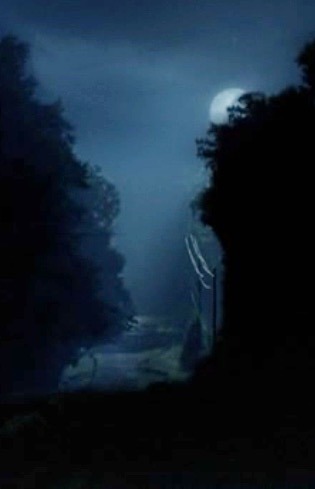
Am I the only one that has always wondered about the lone figure crossing the road? The way it moves makes it obvious that it's not a walker, maybe it's just a nod to the fact that there are people nearby that our characters are never aware of.
Now for the car I'm going to show you two shots, the first is the car as B/D comes upon it. The second when they are climbing out of the trunk.
In the first one we see that both the engine hood and the trunk are slightly ajar but basically closed
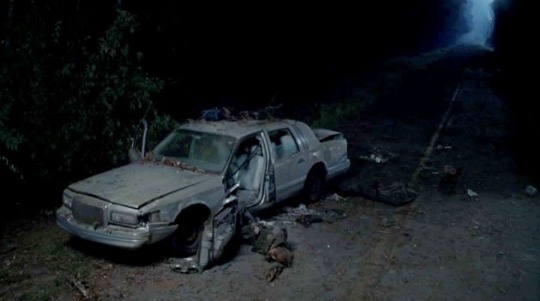
and in the second where we see B/D getting out from the trunk both the front and back of the car are completely opened.

I had never really noticed that before and this time I realized that it must mean something, because everything has a meaning and it seems very deliberate now that I'm aware of it, I just not sure what that meaning is. Any thoughts?
After B/D strips the car Daryl looks at Beth in a dead stare. I have always thought that was him looking at her like "a dead girl.” He turns without a word (because she's dead) and walks down the road. Beth pauses and then follows, foreshadowing Daryl thinking she's dead and leaving her and her later moving down the road basically by herself and Daryl unaware that she's following.
We next see Daryl hunting and his arrow breaks, and he then kills a snake with his knife (not really Norman). You'll especially like this part @Frangi. Norman and Angela's discussion here, Norman mentions that the snake that was killed actually had a rat in it that it had eaten. We see Beth setting up camp and E/J laughingly talk about how during the shooting this scene Beth was refer to as MacGyver Beth.
We are then shown Daryl skinning the snake (that sounded dirty) Beth watching from afar. I don't know how many times I've watched this episode before I realize that this was again a possible foreshadowing of Daryl (TF) being watched.
B/D eating the snake, both E/J & N /A talk about how it was eel with teriyaki sauce and how Norman almost got sick from eating so much of it. We see Beth take Daryl's knife, this is the second time we see her take his knife, the first was in Inmates. She goes off alone and we see her hide from a group of walkers and mislead them with noise from throwing a stone (hear no evil) turning around Beth sees Daryl who has been watching from afar, again foreshadowing anyone? Another little note I missed above was that AK at one point talked about how it was Gimple's idea coming into the writing room for season 4 about the groupings after the prison fell to put Daryl and Beth together and how surprised the other writers were. To me, just emphasizing that Gimple had Beth and Daryl paired from the very beginning and knew exactly where he was taking the storyline with them. He left clues, eggs, hints behind so that when we went back and re-watched they would stand out to us, just like this shot of Beth where she has a dirty little smudge exactly where she is shot in 5e8 Coda, you know the one where her being shot was a last-minute decision. (Me being funny again.)
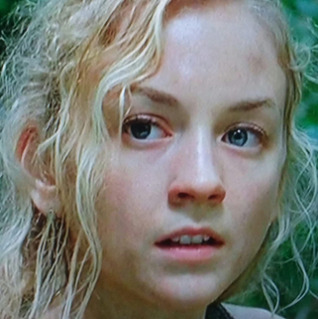
@frangipanilove:
Wow, I never noticed the figure moving across the street in the beginning of still. I had to go and see for myself, and you’re right, there is something there. No way to tell what it is though. I really have no idea. The part about the hood of the car being open is something I’ve noticed, and I don’t have a great explanation of it. Also, the dead body by the car has changed position during the night. I don’t know what tptb mean to communicate by doing so, but I feel that it’s sort of then underlining that this sequence is symbolic, that it’s sort of detached from realism. Sort of them saying that Beth and Daryl’s journey together is something out of the ordinary.
Oh, and something I came to realize while I was doing the tree/three/trunk post; the name of the golf club is “Pine Vista”. Pine is a type of tree, and vista means view, or looking at something. It’s an eye/vision reference combined with a tree reference. I thought that was interesting. I didn’t include it in the post because it was already long enough, but it shows how tptb consistently uses this type of symbolism around her.
It’s something I’ve thought about because in 6x15(?) Eugene mentions golf clubs when discussing the route to hilltop. Then a few moments later he says “serious as a coronary thrombosis”. So, a Sirius mention near a golf club mention. In my opinion it qualifies as a nod to “still” in combination with a Sirius mention, which means return/coming back. Also, the choice of the words “coronary thrombosis” is interesting, because 1) it could be a nod to “slabtown”, where we saw a machine that treats deep vein thrombosis 2) corona is one of the most well known brads of beer in the world 3) someone suffering from thrombosis/blood clots would be treated with heparin, right?
@twdmusicboxmystery: I’d noticed the figure crossing the road before, but I guess I always assumed it was a walker. Obviously, I never paid much attention to the movements. Now, it’s being coupled with a half moon. The open car hood strikes me less as an open trunk reference and more as perhaps a battery reference. I’m not sure about the movement of things either. I’ve never studied it in depth. I know when the camera first pans over the bodies, there are some obvious forehead injuries, and isn’t one of them laying with their arm out, the way Beth’s fell in Coda? But that’s all pretty obvious foreshadowing. I’m just now thinking that, plot wise, it’s the walker horde that moved everything around as they passed through and around the car. So maybe that has to do with what they’re trying to symbolize. Like, TF left her behind and when they went back after the horde had gone, her body had moved. Meanwhile, car, trunk, and hood open. ¯\_(ツ)_/¯ I always love when you bring up Eugene’s line from that episode, @Frangi. And I agree: no way the coronary thrombosis thing isn’t connected to Slabtown. That’s just too specific. @frangipanilove: There was that Sirius mention when Beth and Daryl play the drinking game. I had somehow erased it from my memory, and had a real facepalm moment when that clip was released on social media the other day. It comes when Beth suggests that Daryl has been in jail. Then she says “I don’t mean anything serious”. It comes in combination with a mention of “jail” which actually qualifies as a cop/police reference (making it a “blue clue”), and that whole sequence became even more filled with symbolism. I already knew it was an important sequence, with the mention of pet ponies, frozen yoghurt, Santa clause etc. And with a Sirius mention in the middle of it, it just got more significant!
@wdway:
Episode Still continued. Moving on to the clubhouse E/J talked about the scene that was cut out and how Beth didn't drink because of Hershel and the mention of the red cups. B/D goes into the clubhouse dining room, there are 3 people hanging. The fact that there is three now seems significant especially since I believe that there are 3 bodies in the dog Trot room floor.

Of the two women hanging one is in a green flowered shirt (Alpha green dress) the other has on pearls, which is odd since she's wearing very casual clothes. We will see pearls again with the rich bitch, I think these may be an ocean/water symbol since pearls are found in oysters in the ocean. I also want to note in the shot of the dogtrot room to the right a green bean can and towards the center on the top shelf is a tomato can.

Did I ever tell you that it was the clubhouse scene that made me realize water was a Beth symbol? We were discussing fire and how we believed that was a symbol for Daryl and the question was, was it also a symbol for Beth? I was thinking about all the fire extinguishers, the fire pulls in the clubhouse that were around Beth, when the light bulb came on that these are actually water or coolant symbols. Even though Beth is a water symbol, I believe she is also a single flame symbol, a small fire that can light a large fire. She is the candle flame at the end of a long dark tunnel, the single match that starts a shack a blaze in fire.
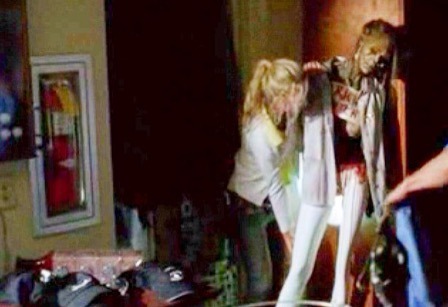
The reason that I bring up the fire pulls and the fire extinguisher is that I consciously went through and counted them in the clubhouse segment. At first glance, they don't appear to be a large number, but when you think in terms of for each one, they were seen multiple times in different angles with either one or both characters within a scene. There are 5 fire pulls, there are 3 fire extinguishers (one silver two red) a total of 8 (these numbers look very familiar) this is a large number when you realize that the club house scenes couldn't have been more than 10 minutes (another familiar number).
There's two other items that I watched for and counted in the clubhouse. We have seen them in the seasons after Still, but I don't think we saw them before. Tomato sauce cans and green bean cans. As far as tomato sauce, we see them instead of actual tomatoes because there wouldn't be a feasible reason to see tomatoes in this abandoned club house, but we can see a picture of tomatoes on the label.

Years ago, I followed a wonderful TD'er weburythedead (unfortunately he no longer posts) but back in the day he wrote about Beth and Daryl and tomatoes. He felt that we could group tomatoes and strawberries together as a symbol for Beth and Daryl because of the color, also their abundance of seeds a fertility symbol also both are quite sensual and juicy.
The green bean cans well what better remind than the white and green can with the word GREEN on it to help people to think of Beth Greene and we even heard and we Daryl refer to her as Greene later in this episode. Throughout the seasons, we're reminded that Maggie is a Rhee and that Beth is the only remaining Greene.
We see 4 cans of tomatoes and 5 green beans cans. There are also 5 cans where we cannot see the label but let's look at one of these that speaks to me and made me quite excited when I realized what I was seeing.

Daryl with a can with a green rim at the top and a red rim at the bottom. A can of Greene and Dixon haha.

In the closet where Beth reaches for a bottle of cooking wine there are 7 cans alone. 2 clearly are tomatoes, 3 visible green labels and 2 labels not readable because there at odd angles. Along with cans in the kitchen area and also remember there is a green bean and a tomato can in the dogtrot room.
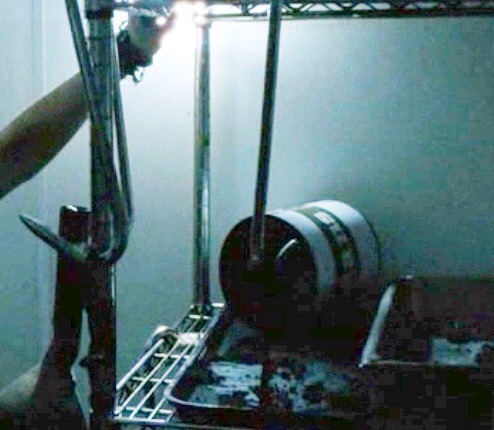
We have seen a lot of tomatoes and green bean cans through the seasons. We've seen them in the AZ pantry. The last time I remember seeing the green and white can the label read, Chunk, but it's similar to the green can so much so that I don't believe it's a coincidence, especially since there is a grouping of candles on top with a single flame burning from each remember Beth = single flame. This was s8e7 How It's Gotta Be.
I have a few things to add before I close out the clubhouse review. These are things mentioned in the commentary that I want to point out. I will have a ramble about the commentary in general when I do part 3 of Still, that will cover the shack. AK said that Gimple is the one that wanted the dog Trot on the wall in the clubhouse. Julius said a lot of was discussed with the grandfather clock, the time and the correct number of chimes.
Something I forgot to mention the other day that happened at the beginning of the Still re-watch, Julius the director said the car that they used was a Lincoln Continental. @Frangi, it proves your car model skills are awesome! I also remember in the after bonus scene of TTD the director came on and mentioned it then also. Imo emphasizes that tptb wanted us to be aware of that car model.
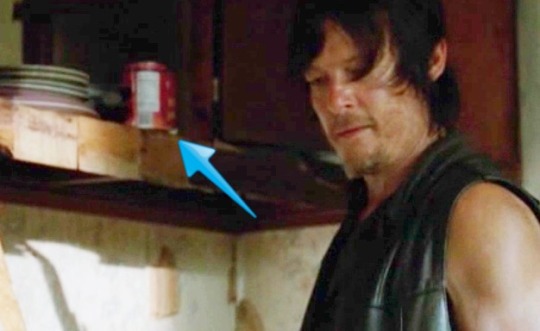
This is in the shack I want you to notice the can on the shelf above /next to Daryl. I talked so much about cans last time I just want to point this one out, we don't see a label on it but since it's red it could be several things, another type of tomato, cherries, strawberry filling?

Then we have these two cans on the table. One we definitely know is a dog food can because that particular label has been seen other times and then the other the label appears to be torn off so we just don't know, but I want to emphasize the fact that in the shack there are 3 cans.
For this last segment I'm not going through the episode because we all know it's so well, instead I'm going on a long ramble about the commentaries. This was the first time in the series that tptb had dual commentaries for a single episode and we could talk about the importance of that, but I'll leave it for another day. I went into this moonshine shack segment review with a couple of questions I wanted to take a close look at and ended up finding side tunnels to my delight. Listening to both EK/JR and NR/AK commentaries back-to-back was the key to the main points I found. 1) that there were certain dialogue moments tptb wanted us to hear. 2) things they wanted reinforced by talking about them with their paired partners. I even wonder if part of NR/AK's commentary was stopped and later sound mixed in order that we would hear the dialogue in a scene. I first want to go over some of my notes from EK/JR that doesn't overlap NR/AK. JR talked about during the argument, it seemed that other members of TF were intimidated by Daryl but Beth didn't seem to understand that she should be intimidated. She was standing up for herself and calling Daryl out on his bad behavior and his feelings. JR talked about how 4 of the producers were crying during the porch scene. In particular, the part where Beth talks about her wish, her hope for how her dad would live out the rest of his life. Sometimes it felt as if JR was checking off a list of things he was meant to mention especially at the end when he said that there was a toy cycle and a real motorcycle somewhere in the yard and was a nod to Daryl's motorcycle. It just seemed as if he was trying to just get that mentioned and it came out a bit odd. JR talked about how Beth almost seemed resigned/come to terms to her death. This was when Beth says "I'll be gone someday," he used the word die or death I can't remember which. Both NR/AK and EK/JR had several mentions that were so similar to each other but I want to point out a few. I first watched EK /JR commentary, a reminder that we hear them but see the episode play without sound unless the commentary stops and then we both hear and see the episode. When it got to the part where Beth hesitates to take a drink of the moonshine, EK/JR stop talking. I paused the DVD to take a note and when I continued it was so long that I wondered if I had somehow turned the commentary off when suddenly they started talking again. I went back to check and it was a full minute and 29 seconds of dialogue that included, going blind, Daryl telling her to drink lots of water, (a water reference) the pink bra, and Daryl's old man's dumpster chair (a dumpster reference). Both the mention of water and dumpster never meant anything to me until I watched it this time.
[@twdmusicboxmystery: I have to insert here that I totally never caught that “dumpster” reference before. Linked to Glenn’s dumpster and how he survived his fake out, if you’re confused. Awesome catch! ;D Okay, back to @wdway.] If you are wondering if we heard the dialogue about moonshine making you go blind during NR/AK's commentary the answer is kind of. AK was talking and NR started to speak, and it just trailed off as Beth said her line and Daryl mentions "drink lots of water," and then Norman finishes his thought. This is what I'm mentioned earlier about maybe there was a sound mix by tptb because the way it trailed off just seemed suspicious if you realize that if he had continued his train of thought we would have not heard the comment about "moonshine making you go blind."
NR then talked about taking the turtle shell for Emily, which is strange because this is where Daryl is talking about his dad's place and how similar it is to this shack. The turtle shell story, while being very nice, just kind of came out of nowhere. I think he got ahead of his to-mention list. AK ask Norman if he had heard of Bethyl and he said yes, Bethyl, Caryl and Rickyl. On both commentaries the couple's stop talking in time for us to hear Beth say "serious." When B/D have their argument outside we hear the Michonne, Carol, Maggie speech. NR talks about the hug from behind and how it must have meant for Daryl to fill her supporting him. When the porch scene starts, Emily mentions the turtle shell and tells a short version of the story. During the NR commentary he again notes the turtle shell in the scene, which makes sense of mentioning it then because we can actually see the shell. A couple of things that EK mentions, we will hear mentioned again by either or both NR / AK. Emily says she loved the porch scene. Just 2 people talking. She spoke about that B/D were being honest during their talk. During EK/JR commentary we do hear Beth says, "I'm not blind." We don't hear it in the other commentary, but I think it was because of what AK was talking about ended up being more important.
Next, I'll jump in with what a AK's response to Norman's honesty statement (below). Just know that this takes up quite a bit of the scene of D/B including when Beth says "I'm not blind.” It really would have been noticeable if AK had stopped abruptly in the middle in order to hear Beth.
AK: "It's not comfortable for Daryl to be intimate with someone, not even romantically but in terms of sharing who he is because there is so much shame. Not so much what you bring to the character or how you've played him. Shame about who he was. There's something about Daryl that's so real and honest. He just is who he is and Beth is kind of the same way, so that even though they're different characters, there's sort of a core kindness and sweetness about them that they can just talk about their real feelings in this moment."
I just love this so much. This is AK defining Daryl's character and I feel she has held true to it through the seasons. We've seen and heard a restating of this especially the last two seasons. But this explains why Daryl will always love his friend Carol but that need of being who he is at his core, honest and kind doesn't align with Carol's guarded, driven way of being and I don't see his qualities being things that Carol admirers or truly understands. I think she sees these as weaknesses and not admirable. Bottom line is she cannot be honest with him. How many times have we heard him this season state that very fact? This speaks to his core, being honest with yourself and the people you care most about.
Connie has many of the same qualities as Daryl but we saw early in the season her asking him to lie for her group or at least not tell. It may seem on the surface to be a small thing but for Daryl, I think he would question if it is a one-time thing or not. It speaks of him not really knowing her Is he drawn to her for who she may remind him of or who she truly is?
I do want to point out that in both commentaries, they talk about the song that Gimple wanted at the end of episode. Norman tells the story of wanting a different song but doesn't go into why he wanted the song that he did. This review has taken much longer than I thought it would, but I hope I was able to uncover a few things that helps in our understanding of tptb and the characters we love so much.
@frangipanilove
Loved your ramble! Totally agree with you, Daryl is honest to the core, wears his heart on his sleeve. And I think you articulated it beautifully when you said he doesn’t know if he’s drawn to Connie because of who she is, or if it’s who she reminds him of. And we sometimes disagree on Carol, but we’re in complete agreement when it comes to how awfully mismatched they would be as a romantic couple. It is only Beth that has been a romantic love interest for him. I am unsure of how far tptb will go in exploring the relationship with Connie.
However, no matter how they write it, I believe it will always be Beth for Daryl. The Connie situation is interesting though, because tptb HAS written a close relation between Daryl and Connie, and they have written it in a way that the GA will recognize as “potentially romantic”. Of course we, TD, also recognize that they have written Connie as a Beth proxy, so it’s all very interesting I think. But I’ve had enough of “interesting.” I’m ready for Beth now.
@twdmusicboxmystery:
Thanks so much to @wdway for doing a re-watch for us and pointing out so many great insights. There were lots of things here I’d never considered before, or simply hadn’t thought about in years. Hope you all found something interesting in here!
#beth greene#beth greene lives#beth is alive#beth is coming#td theory#td theories#team delusional#team defiance#beth is almost here#bethyl
10 notes
·
View notes
Text
Another real long “I don’t like Bumbleby” post (Part 1)
So this one was a long time coming. I kept postponing it, polishing it, making it look the nicest I could, but it’s finally here. And it’s quite long. Let’s just, uh, start.
The first thing I wanna say is, I watched RWBY without interacting with the FNDM, just at the start of this year. I didn’t know what Bumbleby was, nor its impact in the overall FNDM. I was blissfully unaware of what was going on, so I dived in with a clean, open mind.
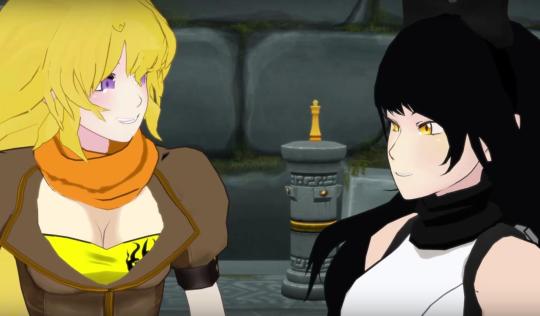
First impressions and development (or the lack thereof)
I didn’t think about Bumbleby. For those who know me, I ship characters VERY easily and I don’t really care if it’s a gay, het, lesbian ship, I can and I WILL ship them. I shipped Ruby and Penny like crazy. Ruby and Emerald made my heart jump. Jaune and Ren looked insanely cute together, and Sun and Weiss had very nice potential. And in V2, in the Burning the Candle episode, when Yang had a heartfelt conversation with Blake, and hugged her, I was like “oh?”. It was the first time I had seen Yang this vulnerable, and while I really ignored her through the first volume, this scene made me realize she was more than it meets the eye. And she chose to be vulnerable… with Blake. Oh?
Then Blacksun happened. Oh.
I didn’t like Blacksun. I still don’t like it. It’s predictable and boring for my tastes. But it has a privilege Bumbleby doesn’t: development.
I will never understand this choice. Barb said it was planned from the beginning. The question is, then: why didn’t y’all spend time developing Bumbleby? Bees will tell me it was developed, but I’ll suggest y’all to take off your rose-colored glasses and revise those interactions. I totally understand the warm, fuzzy feeling when your ship talk, even look at each other (my ships are 99% rareships so I take what I can get), but deep down you know reality isn’t like that. I’ve seen the 40-minute essay about Bumbleby; yes, you can attribute to every interaction a romantic feeling, but I can do the exact same with Jaune and Ren, and fans will roll their eyes at me and tell me it isn’t like that. The only remotely romantic interaction was the whole Burning the Candle episode. It was a nice episode.
“But Onion”, y’all will say, “are you going to ignore V3 onwards? The plot completely ties Blake and Yang together”. Same as Blake and Sun. Yes, Yang lost an arm for Blake, and yes, she feels betrayed and everything, but… why should I think it’s romantic? Blacksun is being developed at the same time, following common romance tropes that apply to the rest of canon ships, so why should I think it’s any different? Yang could have lost an arm for Weiss and I have no doubt she’d have felt the same. (I also think Weiss would have called her and checked on her every day, until Yang even heard her in dreams.)
That brings me to my second point. Let’s trust Barb, it was planned from the beginning. Then what was Blacksun supposed to be? “It makes the point that romantic relationships don’t always work and sometimes it’s better to stay as friends.” Valid point, but… Blake? Sun? Why did you keep at it? Blake, why did you kiss him on the cheek? That’s misleading, for the audience I mean (Sun already knows the script). When I friendzoned guys, and when the girls I know friendzoned guys, absolutely none of them kissed the dude on the cheek. The most they did was give a pat on the back or shoulder. Let me know if it’s an American thing to kiss guys you friendzone, because maybe it’s the cultural barrier that keeps me from understanding “yes, they’re friends and nothing more!”.
And yes, I know Sun told Neptune it was never about that. What was it about then, Sun? Were you trying to get Weiss’ attention by making her jealous? Were you trying to get Blake to paid for the food? I don’t buy that Sun explicitly flirted with her just to be friends. Else I’m an alien and it’s my second day on Earth, or Sun tried to convince himself to feel less pain. Or who knows? Maybe he really was flirting with her to be friends. Maybe he flirted with Neptune too. Writers, give us proper answers. And no, FNDM, filling in the story holes with “show don’t tell, there’s a logical explanation for it” is still fanon and doesn’t count as canon. Show don’t tell is a rule, not an excuse.
Anyways, after the whole coming and going, Sun finally leaves the scene for Bumbleby to thrive on sudden romantic interactions, which are a little late at most. It’s confusing. Yang never felt jealous when Blake showed attraction to Sun. They didn’t choose to clearly spend time together, at least with the “we’re partners” excuse. I’ll delve into this point later, but for now: we had Blacksun, suddenly we have Bumbleby, and we’re supposed to have been cheering for them the whole time. Uhm, was this supposed to be a plot twist?
Okay, I may be biased on this one, but listen to me. I don’t like this kind of plot twist. Oh, we have a heterosexual couple… OR SO YOU THOUGHT! THE TRUTH IS THAT THE LESBIANS ARE CANON! WE’VE TRICKED YOU, WHAT MADMEN WE ARE!
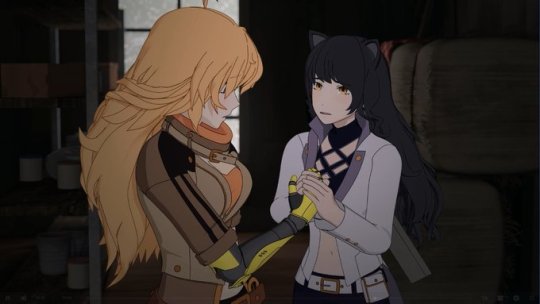
Get it? My problem isn’t that Blacksun isn’t canon. My problem is that the writers are using a wlw relationship as a tool, a surprise, manipulating and tricking the audience. It doesn’t feel genuine--it feels like they just wanted to cause controversy--or sell. At the end of the day, Bumbleby is way more popular than Blacksun, and a big part of the FNDM came for the bees. Don’t y’all ever wonder why voice actors don’t talk as much about other characters, or Ruby herself? The main main character?
Let’s bee honest: at this point in time, the biggest thing keeping RWBY afloat is Bumbleby.
“And what’s the problem with all that?”, bees may ask. “What’s wrong with feeding us some good bees?” Ship whatever you want, y’all. But I don’t like getting ships shoved down my throat and treated as peak LGBT+ representation when it didn’t get the time and treatment it deserved. Not all that glitters is gold, guys. (Especially Yang.)
Racism
Oh boy.
Racism is quite the great deal in Remnant… at least that’s what the show tells us. It doesn’t show it. No, Velvet doesn’t need to get stones thrown at her to show us discrimination. But, you know… if there was discrimination, I don’t think she would be in Beacon in the first place. Or that Leonardo would be the headmaster of Haven… Adam Taurus, pack your things and go home; there’s no faunus discrimination worth the fight. (Wait! Don’t go yet, you still have work to do.)
What does racism has to do with Bumbleby?, you may ask. Well, it’s Blake’s main plot. I think it has a lot to do with Bumbleby… but uh, it seems I was wrong. Yang isn’t interested in it, so I guess it’s just Blake’s problem. Until uh, Adam makes a scene, but that doesn’t have much to do with the fact he’s a faunus. It’s still pretty distasteful of a human to kill a faunus, but I’ll tackle that point a bit later.
Blake’s faunity? is very important to her. If she’s an important person to Yang, why doesn’t Yang show interest in it? She didn’t even defend Velvet, even though she could have punched Cardin in the face. She sits around sighing “It must be hard to be a faunus” and annoys Blake with a lighter. This only shows me Yang doesn’t care about Blake’s identity, and not in a good way.
I know, I know, I take the faunus issue to heart. It must be because I’m a person of color. I could talk hours and hours about the horrendous execution of faunus racism (reinforcing stereotypes, horrible analogies and really unfortunate implications), but I’ll limit myself to Blake for now.
Yang doesn’t care. She’s not one bit interested in reading faunus’ history, in asking Blake about her experiences, in thinking how she could help as a human. She’s like those people who say “I’m blind to race” as if it were a good thing. Yeah, you don’t discriminate, but you dismiss other people’s culture and background. It’s part of who we are. Some of us will take it better, some of us worse, but acknowledging Blake’s identity in this case could do wonders. That way Yang could show interest in her as a person, her motives to fight, her struggle.
But she didn’t. In fact, she did quite the contrary.
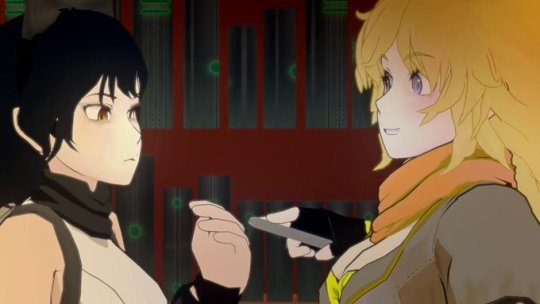
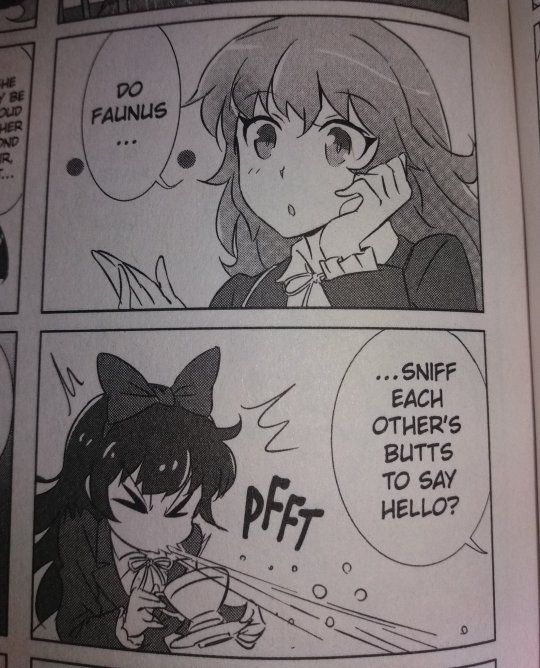
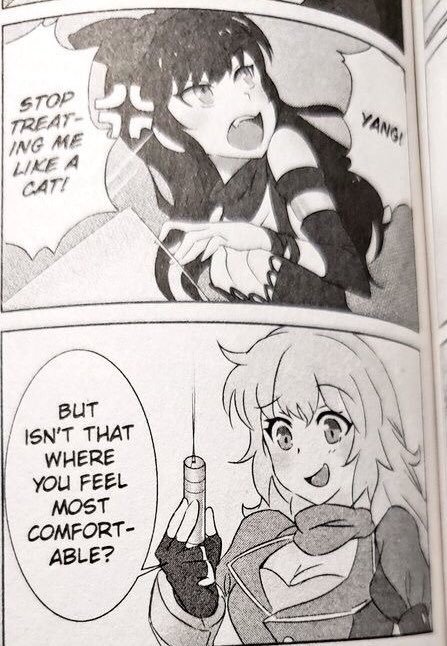
Bonus: I’ve recently seen a… hysterical headcanon. As it turns out, some bees were excited at the idea of Blake getting branded and Yang going berserk, later saving all the faunus in the mine. It was supposedly justified by “faunus needed a reason to respect her” and of course, Bumbleby angst. Do I need to point out the White Savior trope and how blatantly racist and harmful it is? Do I really need to? Considering faunus are supposed to represent the civil rights movement? Especially knowing Adam’s previous treatment? If faunus were explicitly Black, this would be… well, this is a disaster, but it gets swept under the rug. As a woman of color, this headcanon just makes me want to cry.
I think I’ll have to divide it into two parts so it doesn’t get too heavy. Part 2 is here.
45 notes
·
View notes
Text
Review | The White Wolf
Judged by Dawn (animatix07)
Category: General
[ Author: Inazuma_Yoshi]

Title: 1/5: I am going to critic your title according to the following standards: (1) Word choice; and (2) Relevance to the focus of the story.
First, I want to assure you that there is no problem using a language in the title that differs with the language you used in the story. This is because there are words in a language that cannot be exactly translated in another and needs a phrase or a sentence to do so. And, also, your characters are Japanese, to be fair. However, Shiroi Ookami and Aliea Gakuen don't say much. Although at first, I find it that only the nouns are Japanese, which could be acceptable because they are proper nouns, but it just doesn't work. The amount of English and Japanese words is unbalanced, making it a little messy. Use only one language. It could be Japanese or English, but just one.
Second, I want to talk about the relation of the title to the story. The first point I want to make is the focus. A purpose of a title, although this definition is quite controversial, is to give a hint what the story is all about. Also, a title carries the underlying theme of the story, or sometimes a significant event. The only thing you need to remember in a title is that it should be heavy—it should carry a lot of meaning other than telling what happens in a story. In the case of your title, however, it does not say much. In fact, the revival of Aliea Gakuen is not even the focus of your story. The focus of your story is only a certain group of students in Aliea Gakuen, not the whole school itself, not even its revival (at least, that's how it looked like to me). You placed the noun Aliea Gakuen there, which is, in a sense, collective. Therefore you should include other things in Aliea Gakuen outside of your focus characters. Include the system, the society's acceptance towards the school, perhaps some problems that they only have little students because most parents are afraid of the school because of its history.
If that's not the focus you want, then consider changing the title altogether.
Aside from the fact that it doesn't say much, it also says about something which isn't even in the story—the Shiroi Ookami. The White Wolf. This particular detail never made its appearance until the story is almost done. There's no problem with that, but including it in the title gives it a sense of importance. The story didn't give it any. I understand that he may appear in a sequel, but if the Shiroi Ookami is not really important in this book, do not make it look like one. Because, I have to warn you, it cheats the readers. Remove it, if you must.
Summary: 3/10: First of all, I like how your summary is short and engaging. It tells readers who the characters are, the event connected to the conflict, and a hint of the said conflict in a thrilling, mysterious tone. It has potential. However, the biggest problem is this: the characters mentioned are not the main characters, the event is not a significant event, and the conflict is not the real conflict. In other words, the problem of your summary is its tendency to mislead. Your main characters are the Aliea Gakuen kids, mention them in your summary. By first mentioning Endou and the Inazuma Japan team, it gives the impression that the whole story will focus on them as the main characters. But they only appeared twice in two different chapters, both are at the beginning of the story. The rest did not leave its focus on the Aliea Gakuen and Ohisama En.
I do appreciate the connection of your title and the summary—you tried to make the revival of Alieal Gakuen mysterious. Unfortunately, the story isn't as mysterious as the summary. Remember, the central focus should the be content of the story—the title and the summary revolves around it. Again, know who the main characters are, give them significance in your summary. Know the main conflict (and it's not the revival of the Aliea Gakuen, I must say), give a hint of it in the summary.
Plot: 10/25: In this section, I would like to tackle six things: (1) Chapter 1; (2) Surprise Elements; (3) Consistency; (4) Grounding; (5) Details; and (6) the Shiroi Ookami.
The first chapter started with Endou and Inazuma Japan. It coincides with the summary, yet, just as mentioned before, they are not really the focus of the story. Although starting with characters who are not the protagonists are fine, as long as it proves significant in the latter part of the story. Chapter 1 (and the other chapter with Endou and the gang) did not really contribute to the story. In fact, you could start directly where the Aliea Gakuen kids accepted Hiroto back with them and their school and it will never affect the plot. And that's what I am suggesting to you—go directly to the important part. Start the story where it is already important, don't drag the story with unnecessary dramatization.
Moreover, I have to say that mysterious element of the Aliea Gakuen school came from an unrealistic cause. It is quite strange, unconvincing, that a coach would suggest a reward to tour around schools right after they landed in Japan. First, they should be tired after the championships. Second, their parents would most likely not allow it, especially because they just came back from overseas. Third, it sounds so forced, like you are willing to make things unnatural so the story would go your way. Fourth, why do the coaches have to hide it? Fifth, it's also forced in a way so that they could go back to Hakuren and reminisce and repeat what happened before. Yes, there's a twist, but that twist did not work either. And with that said, I will move on to the next subject—the surprise elements.
The twist I mentioned above refers to the appearance of the new Aliea Gakuen, trying to scare the characters and the readers then flip it at that instant as if to say, "hey we were just kidding." First, it did not work. Second, it's way too obvious. Third, it's another unnecessary dramatization. And fourth, at that point of the story, the conflict was still not introduced, and it was already the third chapter. In other words, the story is dragging. It has a lot of unnecessary dramatization and scenarios that can be emitted without affecting the whole plot. If you want to keep the readers engaged, write what matters and only what matters. Here, I would like to suggest cutting to the chase—start where Hiroto heard his old evil school is back on its feet, introduce the conflict right away.
The next part is consistency. And I have to say that your story lacks one. First is because there are times when you drop a certain detail then changes the next chapter, such as when you mentioned that Kenzaki also went in jail, then suddenly appears in a chapter. Was he also on parole, just as what happened to Seijirou? If so, it would help to clarify this detail. Again, if you are aiming for some mystery in the story, make sure that your details are consistent, and at least linked to one another.
Grounding is also one of the things lacking in your story, and I am looking at the powers your characters have. Where do these powers come from? Why do they have such powers and others don't? Perhaps you felt free adding this considering the hyperdimensional soccer they already have, but remember that hyperdimensional soccer is normal to them. Having powers outside soccer is not. Perhaps it has something to do with the experiments back in Aliea Gakuen days, but that's all your readers could do—make assumptions, and in the end they still can't be sure why there are powers in the first place. I don't think there were any hints about it in the beginning either that would convince us that such powers were possible. It wasn't enough for the suspension of disbelief.
Now, for the details...aside from their consistency, they are also a bit unconvincing. I'd still like to point out the powers the characters have. It just seems very unlikely that the Aliea Gakuen kids' powers emerged at the same time on the same day. It makes me feel like you are too impatient to reveal that they have powers and that when a chance to reveal one's power resulted in revealing the rest of the others'. Moreover, there were no explanations for such synchronization anywhere.
Also, there are other scenes in the story that seems forced that they became unconvincing. It seems that you are pushing your story a bit too much. There's a lot of room, yet you are not using the space to its full potential. Don't worry about making your story longer—if it needs to be that way, then it will be that way. Remember, you, as a writer, do not decide how long a story should be. The one that decides it is the story you choose to tell. And if you've chosen such complicated plotline, it needs a lot of room to be told effectively. Please reflect on this.
Lastly, the Shiroi Ookami. As I mentioned in the Title section, the hint of this White Wolf never appeared until Chapter 10. Your readers would've forgotten about it by then. And it doesn't sound too important—not for this book anyway. It could be in a sequel (and I think I remember you mention there is one), but not in this book. If it's that significant, mention it as early as possible, convince your readers that it is important, or remove it if it's not.
Characterization: 8/20: Before I start, take note that your characters are part of the factors that affected your plot. Hopefully, after reading this section, you can connect why your characters affect the plot and how it should work for you.
For this part, I want to talk about three things: (1) The number of characters; (2) Dialogue; and (3) Inconsistencies.
Let's go straight to the point; your characters are all flat. They all talk the same way, they act the same way, sometimes I think I'm listening to a single character with different faces. The dialogues themselves are so lacking that it wasn't doing its main job right—to characterize a character (I will elaborate on this later). One of the problems here lie on the fact that you have a lot of characters—you stuff them in one scene and made sure they all participate in it. It's not that it's a bad thing, but this kind of stunt is pretty hard to pull off. It makes your readers wonder—who are the main characters? It's difficult to say that it's the entire Aliea Gakuen kids because not all of them have the appropriate screen time to be considered "main characters". I believe your number of characters made it difficult for you to focus on one or two characters to completely dwell on. As a matter of fact, the story won't have any problem with only one main character and have the rest be supporting ones. Don't be afraid to do that—it won't violate the collective sense of Aliea Gakuen.
Moreover, there are problems concerning some of your individual characters. There's that little detail about Midorikawa being the new captain of the new school soccer team, and it was pretty realistic that it pressured him considering that some of the members were from teams that were stronger than him in the past. I like that. But it lacks buildup, meaning that, in one scene, the pressure just came without any warning. The pressure should start from the beginning as a small concern for Midorikawa. Then the more things came to be, the more he realizes that he's going to lead a team with members who're stronger than him before. Build it up gradually, slowly, until a certain point that it would almost break him. The scene is just a suggestion, but it was an example of the buildup I'm talking about.
Takeshi also has a little problem, and I think it's fine to make him as a representative for the rest of the OCs you've used in the story. His first problem is that he came out of nowhere. Aside from the fact that he is Hitomiko's uncle and Seijirou's brother, who is this character? What kind of person is he? What is his background? You did not even give him any distinctions for me to remember what he looks like. Because he is an OC, it's your responsibility to make this character stand out as the rest of your "borrowed" characters, as I'd like to call it. He may not be a character from the series, but that does not make him less important. Remember, all the characters you involve in the story must have their importance for being there.
Now, the flatness and the lack of characterization of your characters also have to do with your dialogue. It's difficult to say whether your characterization affected your dialogue or if it's the other way around, but because dialogue characterizes a character, it has its role. First, like I mentioned above, the dialogue failed to do its job—characterize a character. Every person talks differently, and that is one of the things that differs one character from another. Second, one of the reasons it failed is because many times in the story the dialogues sounded so forced and unnatural. If you're not sure, try reading your story out loud. Third, please don't involve dialogues that need not be there. If it does not contribute to its role—to characterize, to give information, to move the story forward—then you don't have to include them.
The inconsistencies are just the details I want to point out. Inconsistencies in characterization will ruin characterization as a whole. With that being said, Endou and Midorikawa do not use the honorifics "-kun" in referring to their friends. Honorifics are one of the characterization techniques used by the Japanese, that's why it gives us the sense that Fubuki and Hiroto are the kind types of people that use -kun referring to others. Endou and Midorikawa, however, are not that kind of people, so it seems off hearing the "-kun" from them. Also, in Chapter 1, it's very unlikely for Furukabu to get them lost. Shouldn't he know where to go since they've already been in Hakuren before? Be careful in small details like this.
I'd like to mention one thing here (because I think this should be included here rather than in the plot). Kenzaki's motive for controlling over the school is vague, if not completely unknown. If this motive is not laid out clearly, there will be problems in the way Kenzaki will act, and thus also affects your plot. Taking revenge seems pretty shallow as well, considering that he just got out of jail and that he seems to have involved other people with him. Has he got nothing to lose, if that's the case? Please, make it clear.
Despite everything, I'd like to praise you on the dialogue in Chapter 1 between Endou and Kazemaru. That was one of the most accurate characterizations I found in your story. That really caught my eye, and I think you should base your dialogues there—see how Endou and Kazemaru interact and analyze what made Endou's dialogue so Endou-like and Kazemaru's so Kazemaru-like. I also like the part where you described Rococo as African. That, itself, is character.
Grammar and Writing Style: 9/15: Your chosen critique specifics are all under this rubric, and I have to say that this is where you excel the most.
You have simple sentences. And I could see it's really part of you. There's nothing bad about that, however, it seems that you are forcing yourself to use higher prose, meaning that some descriptions are quite exaggerated, some are unfittingly (I tried not to say 'wrongly') metaphor-ed. Don't feel bad about simple sentences. Some great writers write like that, and as long as they are consistent with the simplicity, their stories are going to be fine. So is yours. If you're trying for something new, practice. But keep it consistent. Sometimes you're trying higher registers, sometimes it's simple. Don't force yourself. Simplicity is also beauty, you know.
Your imagery, I have to say, is quite underdeveloped. It affects your setting a lot. Most of the time, I don't know where your characters are. I have to read out of context to know where you put them. Learn how to ground your characters so your readers could be there as well. Imagery is one of the things that could engage your readers. Setting, most of the time, is what makes your readers think they are inside the story; because they know what the place looks like. However, don't overdo the descriptions. Some writers can pull off very detailed imagery in one short paragraph, and it is encouraged to keep it short and concise—as short as possible. I'm not saying your descriptions are long nor they are short. Only, it's inconsistent. At one point you describe something in detail then describe things vaguely the next. Both can cause unnecessary info-dump and vague imagery. Be careful.
Transitions are a bit of a problem as well. You switch from one scene to another without any signals. If you want to keep it simple, you can just skip a line; space is enough for your readers to know the scene changed.
Next, avoid commentaries. In a narration, especially in third person omniscient point of view, the narrator—the author—is the one telling the story. It is the point of view where, most of the time, there are tendencies of commentaries. What I mean about this is the side comments from the narrator inside a narration, which is not a good thing because it brings too much attention to an author outside the story. The only thing readers should pay attention to is everything inside the fictional world. Even if a narrator's voice is there, you have to hide behind the glowing glory of your story. There is the tendency of getting detached, therefore it ruins the engagement of the readers.
You use too much passive voice. What are passive voices? There are the sentences that go like: "He was bitten by a snake;" "She was grabbed by the wrist." Avoid this; instead, do it like this: "The snake bit him;" "He grabbed her by the wrist." The purpose of this is also reader engagement. Passive voices give less sense of action and less sense of present time, meaning that "He is bitten by a snake" tells more of the past than "The snake bites him". However, I'm not saying to always use active voice. Balance is the key. The more you practice the more you'll know when to use them.
Lastly, fix your dialogue tags. The saying "said is dead" is a myth. Editors complain about the over-beautified dialogue tags such as "he asked," "she murmured," "he grumbled," "she exclaimed." Do not overdo it. Said is not dead, and most of the time your readers will not notice them. It is more appropriate to use said if your character did say something. When your character exclaimed, let the exclamation point tell the readers he's exclaiming—don't use "exclaim". It's redundant.
You still have a lot of room to improve in your writing style, but I still like the simplicity of it. Make use of that, it could be your own style. You don't have many problems with grammar, just a bit of typos here and there. But I believe you know your grammar, and the more you write the more it becomes natural to you. Keep writing.
Originality: 4/10: To tell you the truth, there's not much originality in it. Powers, the plotline, the spying, anyone had seen them before, even in Inazuma Eleven fanfictions. I should tell you that the lack of originality is also because of the lack of details. The powers, mostly, needs more grounding, especially because their powers are random except for those characters with obvious elements like Nagumo and Suzuno as fire and ice.
You also used the same "car accident" scheme here. Although it turned out to be a set-up, we've also already seen that in the series. The whole story did not provide an explanation, and Hitomiko's explanation is pretty vague as well. As long as you don't have anything original to explain that, this story will just be like anything else.
However, it does catch my attention the fact that Nagumo was the first to master his power first. You are good with those small interesting details, including Rococo being an African, and I think you should work yourself from there.
Feels Factor: 6/15: This rubric is affected by the rest of the rubric. The surprises did not work, some elements are pretty obvious. And the way the character personalities are forced make them unbelievable, so we do not really "feel" anything with these factors ruining the reading flow. It did not surprise me when Aliea Gakuen revealed that they are not evil. It did not thrill me what was going to happen next. At some point, it's quite predictable. I did not feel what I should have felt in certain scenes. I have to deduct a lot, nine points, for this.
[Raw] 41/100 [Final] 41%
Banner by -artxyuki
#review#the white wolf#inazuma eleven#endou mamoru#nagumo haruya#inazuma japan#aliea gakuen#kira hitomiko#general#supernatural#thriller#mystery#long-fic
1 note
·
View note
Note
For fanfic writer ask meme: E, J, K, M, P(for any fic or all your fics), R, T, X, and Y. (If that's too many questions, then you can split the answer into multiple posts. Also, no need to answer if you already answered these questions before.)
Thank you so much! I’ll put these below a cut just to account for the length, and I pray Tumblr works like it’s supposed to this evening! I appreciate you having an interest!
E: What character do you identify with most? Is there a certain fic of yours that captures these qualities particularly well?
I really do not identify with Gorillaz characters and thank god for it, or most characters I tend to prefer! Haha, I know that might sound a bit strange, but I can think of very few characters I’d call “my favorite” that I also felt were a reflection of myself in a major way. Of course that isn’t implying that representation isn’t important, but just speaking for my own personal relationship to media– I live with myself all the time, I like people who live very different lives! Having said that, of the characters I write (all two, possibly three of ‘em) I’d say I identify with some of Stu’s worst qualities over anything else: being unambitious but craving reward, self-centered yet lacking in a concrete sense of self, dumb about mostly everything, overcompensating (to be fair, this is Murdoc as well) and so on. Despite picking fun at him I definitely have an affection for an unlikable guy like Stu, I do have sympathy for being sorta pathetic because I feel like I can access that.
J: What’s your favorite fanfic trope? Have you written it?
Hmm! That’s hard to say! At the risk of being an absolute knob, I don’t tend to be a fan of tropes, or at least what I think is meant here by “fanfic tropes” like uhh… the heat goes out and we have to share a bed, or that kind of thing? Is that what this means, the sort of repeated setups for fics? There’s of course a place for everything so I’ve got no real beef with more innocuous stuff, but I wouldn’t say I ever pick to read something because it’s got a “classic” trope. I’m definitely rife with tropes in the broader sense though, I’m rife with things I like and clearly just repeat, haha. I do not smoke pot, but I have a real affinity for characters who do, and this is evidenced by having like… half my stories feature that, haha. If a scene where two characters creep up to being intimate via sharing a joint/bowl/bong counts, that’s definitely a trope I’ve done and would probably do again.
K: Do you have a guilty pleasures in fic (reading or writing)?
Does the above count? I’d certainly call myself self-indulgent, haha, I like what I like and I don’t stray very far from it. I think unsatisfying or incompatible intimacy is really interesting and I honestly never get tired of reading or writing that. (Er, as much as I “don’t get tired” of writing anything, which is not saying much as I’m very bad and undisciplined.)
M: What’s the weirdest AU scenario you’ve ever come up with? Did it turn into a story?
The only AU I’ve written is Coffin Dancer, which is a story set in the early 1900s about Murdoc being a reanimated corpse and Stu being a gravedigger who buries/exhumes him. Sexy, I know, nothing hotter than… long paragraphs about digging. I think the occult element makes that one a bit weirder than anything else I’ve come up with. I’ve kind of entertained other AU ideas but they tend to be a lot more mundane, to be frank I just really like the characters as they are and I don’t want to change their dynamic too much. As a joke I once suggested something about a riverboat casino (Stu working there, Murdoc trying to pull a money laundering scam via currency exchange, potentially convincing Stu to go in on the scam with him) and I’d be lying if I said I didn’t still think about it sometimes and question how to make it work, haha. I think it might be fun to do an AU again, but I think there’s just too much of a gap between what I’d want to do or be capable of doing, and what people actually want to read.
P: Where did you find the most inspiration for your story ?
Oh gosh, this makes it sound so important and I feel like the biggest jag going to pretend I’ve made anything that great or with particularly impressive roots, haha. A couple came from prompts, so that’s a fairly straightforward answer.
I first began planning Coffin Dancer because I was playing Graveyard Keeper on Steam at the time, haha. If you load up this game, you’ll quickly see there is next to no plot and it is simply a crafting sim. I just sorta… liked the setting, I guess? It is the 1900s and it does follow a graveyard keeper! Following that, I decided it would be a story about Murdoc’s skin turning from tan to green as it does in canon, but giving it a bit of a morbid tint, as opposed to the vague canon handwaves of Murdoc being “immortal” with no clear explanation of what that means.
Ampersands was mostly inspired by me being a big Buffy the Vampire Slayer fan and thinking it’d be fun to show a dynamic similar to Angelus/Drusilla/Spike, but heavily reworked to fit our characters. The first scene I imagined was the shoelace-tying one which has some resemblance to a shot of Angelus knelt at Spike’s feet while still mocking him, and that ended up being the very last scene I wrote (and probably one of the weaker ones.)
On Oysters and Black Water was actually the story that required the least research from me, as I already had an interest in oyster filtration and oyster reef restoration. By no means am I an expert nor is this story a genuinely educated look at this process (I am Genuinely Educated on zero things) but I definitely knew when planning a PB story that I wanted oysters to be used for a filtration system on the island, just as a little nod to something I find neat!
R: Which writers (fanfic or otherwise) do you consider the biggest influence on you and your writing?
This really puts me at risk of sounding knobbish, so to start with: I’m not really a writer. Fanfiction writer is already not the most impressive title, but even that I feel is a little generous for me. I’ve written things, but I struggle far too much and have too little dedication to pretend it’s something I feel “cut from the same cloth” as these folks to do. The writers I admire have “influenced” me in the sense that I’ve wished I could write that way, and I’ve probably/definitely ripped them off.
Some will find this laughable, but I’m a fan of Joey Comeau’s writing style. I’ve enjoyed every book he’s published, in particular the short novels Malagash and Lockpick Pornography, and especially his… err, non-novel collection of cover letters Overqualified. (I think I’ve read Overqualified more than anything else on my bookshelf, but this is saying very very little as you can sit down and read it in about 30 minutes.) The darkly comedic way he presents these ideas, how he’ll expand on these very offbeat details and veer so far from the topic, then take sudden sharp turns into something uncomfortable is just enjoyable to me.
Also somewhat cliched now, but Peter S. Beagle’s The Last Unicorn is a beautiful book to me. Beagle’s writing style is ideal for the fantasy setting, the poetry in his prose does not tip over the “purple” line for me (but I’ve always been unclear where the line is, obviously) and I’d really… feel like I’d accomplished something if I could say anything half as powerful as this book.
Shirley Jackson, (famously) the author of The Lottery and (less famously) We Have Always Lived in the Castle springs to mind as well. The latter in particular has a gothic tone, an at times strange sentence structure and an unreliable POV, which probably influenced Coffin Dancer stylistically and everything else I’ve done in perspective/structure.
But as far as influences, nothing more directly influenced me than @elapsed-spiral‘s writing and characterization. Old drum I’ve beat before, but it’s simply the truth. I would not have tried to write fanfiction again (after… many, many years) if I hadn’t found Danni’s stories and felt that excitement of reading something truly special. Now, it’s important to note that Danni is British so they’ll come out in hives if I praise them too much, but sincerely nothing in recent years has made me feel a “passion” for reading or writing like Yearz did. The oneshots Fairy Vale and Beside the Sea also deserve special mention for just being goddamn phenomenally good character studies. “Influence on your writing” could be misleading, in the sense that Danni’s biggest strengths (namely Being Funny, Being Realistic and Knowing What You Are Talking About) are among my biggest weaknesses, and I don’t feel that stylistically we’re all that similar; on the flipside though, I think so much of my “improvement” is really owed to Danni, aaaand I don’t think you’d ever look at something I’ve written and miss the fact that it’s ripping off Yearz in one way or another.
T: Any fanfic tropes you can’t stand?
Ahaha, alright, this jogs my memory and I do remember stepping on eggshells to answer this before! I mentioned above that I’m just not a big fan of tropes in general, but that means nothing as I don’t… have good taste. I never have. Famously bad taste over here. I don’t have any interest in raining on anyone’s fun or policing fan content, but I think we’re all perfectly fine just co-existing without feeling obligated to anything. More than anything else, in Gorillaz specifically I’d say there are some portrayals of their relationship that I find a little dodgy and I tend to avoid, but I recognize full well that many people may feel the same way about me! I also just like the characters to be compelling and to be themselves, whatever your version of them is. Of course my characterization is bonkers and mostly made-up and I have no expectation that someone else’s should resemble mine, but even if we have different ideas, I don’t like to feel you can slot them out and anyone else in? Which is why standard tropes like “coffeeshop” or “fake dating” don’t tend to be my favorite. Oh, I’m also a fuddy-duddy and I don’t love the nicknames, haha.
X: How would you categorize your fanfic reading? Are you a voracious reader? Do you carefully pick and choose? Something in between?
I’m not a very big reader these days! I’d like to offer you a good excuse here, but I’m just picky, truth be told.
Y: What are your thoughts on your personal satisfaction with something you’ve written vs. the popularity of your stories? Do you tend to be most satisfied with your most popular stories?
In total honesty, it takes all of about a month to become completely unsatisfied with anything I’ve written. That’s not like, a plea for sympathy, it’s just being objective. I write comparatively little and comparatively slow, so whatever growth that may happen is still pretty limited and it’s a little disheartening, even if it’s also my own fault for having poor discipline. I would not call any of my stories “good,” at best “good for what they are.” There are definitely some I wished did better, I wished with a stupid amount of sincerity would hit some magical validating number that would Suddenly Mean It Was Good… but after a little distance, I can always understand why they wouldn’t.
Hoooowever, some are undeniably worse than others. Based on both hits and kudos, my most popular story is my first one (I Couldn’t Feel, So I Would Touch) and this is truly baffling as it’s garbage. I mean, with no exaggeration I just think this is bad writing through and through, it’s truly just the worst thing I’ve written over the age of 20. I hoped I’d get this question purely because of this, haha, I feel such shame every time I see this story at the top of my statistics page. If we consider that to be the “most popular,” no, I do not tend to be most satisfied with the most popular story. We could define that differently though; for example, I think the story that got the most notes here and I received spectacular fanart on (a thing I just… can’t believe can happen, how nice is that?) was Oysters, and at a time I did consider that my favorite, I was incredibly proud of it when I posted, and even if I’ve grown exhausted by my overwriting too much to read it again I do still rate it pretty favorably compared to the others. So it depends on what constitutes popular! But if we’re just talking hits and kudos, sadly my stats page puts some of the worst stuff at the top.
#i've got to head to bed so i apologize if there are any glaring errors in this answer!#Anonymous#thank you very much for the letters! that's a kindness!
2 notes
·
View notes
Text
EVERY FOUNDER SHOULD KNOW ABOUT ESTATE
I got the impression it might be wise to tell them what to do, instead of having to buy whole albums. And not just because things change faster, but because the space of possibilities, or when one idea is the same reason we're bad at. That's the way to do it for free, and till recently a company giving anything away for free, in their hearts, still believe the most important mistake in the history of philosophy. That may come into it. The initial focus should be the product. Difficult though it may be worth standing back and understanding what's going on in the heads of people who do great things have careers with the trajectory of a ping-pong ball. Wittgenstein deserves to be famous not for the discovery that most previous philosophy was a waste of time just studied other things. Any conflicts between them have been ironed out under the very hot iron of running a startup, you'll probably get something better. Will I ever read it? I wouldn't know about it now except that a few months ago, the first thing they'll complain about is the lack of time. You might get it. Why do readers like the list of n things, this work is done for you.
They forgot that companies about to go public are usually rather stretched, and that he did all the actual design of the average big company demands an attention to politics few thoughtful people could spare. The eminent, on the other hand, are weighed down by their eminence. If you don't, you're dead. I once wrote that startup founders should be at least 23, and that alone is a black hole. People who aren't smart at least try to act that way. It's so subjective. Systematic is the last word I'd use to describe the way good programmers write software. Instead of quietly switching to another field, he made a fuss, from inside. Their job isn't to get good grades. I was writing a talk for investors, and I understand the startup world pretty well, and they, though a small minority, really do care about good design. As a kid there's a magic in small things that goes beyond such rational explanations. The idea of evolution is another.
Market mechanisms no longer protect you, because the harder it is to be willing to look like a fool. This is a new essay for the Japanese edition of Hackers & Painters. And why should there be any limit to the amount of work available for companies, and the result was miraculous. Whichever route you take, expect a struggle. In fact, if Bill had finished college and gone to work for one. Do abstract ideas exist? And yet they seem the last to notice. Joel Spolsky recently spoke at Y Combinator about selling software to corporate customers. When I was in grad school, a friend in the math department.
That's the sense in which startups pay better on average, because there is a long slippery slope from making products to pure consulting, and you can decrease how much you make, and you don't have an idea for a Web 2. In many technologies, version 2 has higher resolution. But we were comparatively old when we started that our users were called direct marketers. While young founders are at a disadvantage when coming up with made-up ideas, they're the best source of organic ones, because they're at the forefront of technology. Computers are precise and methodical. The adult response to that's a stupid idea, a kid will either crawl away with his tail between his legs, or rebel. You could also try the startup first, and that's not good for thinking. If you do anything well enough, you'll make it prestigious. In the intervening years an unfortunate idea took hold: that it was good for even the most promising kids to start at the bottom, so they try hard to choose well, and it turns out you can help one another in some way. There's no concept of office hours in most startups. Closer, probably, than the men running our government, who for all their talk of patriotism remind me more of Richelieu or Mazarin than Thomas Jefferson or George Washington.
For example, it would be misleading to say the field is still at the first step. In order to get tenure, but it's better for everyone else, including professors who already have it. If real estate developers operated on a large scale, and there is a deeper reason that hackers are alarmed by measures like copyrights and patents. Hacking something together means deciding what to study in college. And if, like most people, who are still in denial. A real essay, as the name implies, is dynamic: you don't learn from other fields, and when they're feeling ambitious, plain theory. Actors don't face that temptation except in the rare cases where they've written the script, but any speaker does. Wozniak's work was a classic example: he did everything himself, hardware and software, and the different parts of the company were using it instead of Yahoo for search. We put little weight on the idea.
I first noticed this at a conference several years ago. The word is used more often in the former than the latter sense, probably because ugly solutions are more common than brilliant ones. Rtm and Trevor and I went to look at the Apple garage. It's just a legitimate sounding way of saying they need someone to tell them that tediousness is not the defining quality of work, done by a bad writer. Much to their surprise, they didn't arrive at answers at all. Many have just graduated; a few are still in school. Summer jobs at technology companies are not real jobs. And though we differ from other investors on a lot of mistakes. But the world has gotten more complicated: the most dangerous traps now are new behaviors that bypass our alarms about self-indulgence by mimicking more virtuous types.
#automatically generated text#Markov chains#Paul Graham#Python#Patrick Mooney#measures#Combinator#copyrights#concept#patriotism#people#hold#eminence#writer#developers#hackers#fact#name#patents#lack#idea#hole#product#technology#anything#startup#Closer#hand#things
1 note
·
View note
Text
Smart cities, bad metaphors and a better urban future
Smart cities, bad metaphors and a better urban future
https://theministerofcapitalism.com/blog/smart-cities-bad-metaphors-and-a-better-urban-future/

Maybe it’s one cliché — I think I used it myself — to say that the explanations of scientists and philosophers about the workings of the brain tend to metaphorically follow the most advanced technology of their time. Greek writers thought that brains functioned like hydraulic water clocks. European writers of the Middle Ages suggested that thoughts functioned through gear-like mechanisms. In the nineteenth century the brain was like a telegraph; a few decades later, it was more of a telephone network. Soon after, no surprise, people thought that the brain worked like a digital computer and that maybe they could build equipment that worked like the brain or talk about it. It’s not easy because, aside from the metaphors, really no one sap how the brain works. Science can be exciting like this.
The absence of a good metaphor has not stopped anyone student brains, of course. But sometimes they confuse the map with the terrain, confusing a good metaphor for a feasible theory. It is easy to do when it comes to complex systems that interact on too large or too small scales for us to observe in their entirety. This is true for the brain, a mass of thought that generates an individual mind, according to researchers, about 86 billion individual cells woven into a network of electrochemical gelatin. And it is true for a city, the dense network in which millions of these individual minds come together to form a community. People who write about cities …I did it myself–too they tend to taste to organize metaphors in current science. A city is a machine, a city is an animal, a city is an ecosystem. Or maybe a city is like a computer. For urban and media studies writer Shannon Mattern, this is the dangerous one.
Mattern’s new book comes out on August 10; is a collection (with revisions and updates) of some of his very clever works Place diary he called A city is not a computer: other urban intelligences. In it, Mattern struggles with the ways in which a particular metaphor has disrupted the design, planning, and coexistence of cities in the twentieth century. It goes through all scales, from monitoring individual people as if they were bits to tracking the widescreen data needed to keep a city functioning for the good of its inhabitants. Of all the ways information can travel through an urban network, Mattern says, it would probably be better for public libraries to be the nodes than the panoptic-like centralized boards that so many cities are trying to build. The problem is that the metrics that people choose to track become goals to be achieved. They become their own kind of metaphors and are usually wrong.
Courtesy of Princeton University Press
The first two essays were the ones that caused the most problems when they were first published, and they still are. “City Console” is a wild story of information boards and control rooms designed to be panoptics of urban data. These information centers collect information on the operation of municipal systems, crime surveillance, children’s education, etc. Mission control, but for highways and sewers. My favorite example from Mattern’s book is the 1970s effort by Salvador Allende, then leader of Chile, to build something called Project Cybersyn, with an “operating room” full of chairs with buttons that would have made the Captain Kirk was proud, in addition to wall. size screens with flashing red lights. Of course, since no city had real-time data to fill these screens, instead they showed hand-drawn slides. It’s crazy, but there’s a direct line from Cybersyn to the way many U.S. cities now collect and display law and order and other urban data in CompStat programs. Supposedly yes make the government accountable, but they often justify useless arrests or highlight misleading figures: one-time traffic trips rather than the number of people transported, say.
In the next essay, the headline, Mattern warns against the ambitions of large Silicon Valley companies to build “smart cities.” When the trial first appeared, Amazon was still about to build a city headquarters in New York and Google was pushing to do the same in Toronto. (The Google project, from a sister company called Sidewalk Labs, would have appeared wooden skyscrapers, pavement that used lights to reconfigure its uses on the fly, cars with automatic driving and underground garbage pipes.) Now, of course, most large smart cities with technology projects have failed or s ‘have reduced. Hudson Yards in New York did not deploy at any level close to the level of sensor and surveillance technology that its developers promised (or perhaps threatened). Cities still come together and share all kinds of data, but they are not exactly “smart”.
In a conversation last month, I asked Mattern why it seems like tech companies haven’t been able to intelligently understand any city, at least so far. He thinks it’s because they missed the most important parts of creating cities. “Many ways of thinking about more computational, data-driven cities give a false sense of omniscience,” Mattern says. City officials think they get raw truth when, in fact, the filters they choose determine what they see. “When everything is computational or when we can operationalize even the most poetic and evanescent aspects of a city at a data point,” says Mattern, “this makes us unaware that it is a metaphor.”
Source link
0 notes
Text
Death Battle Review: Raven vs. Twilight Sparkle.
Season 5, Episode 2 (or Battle 89) is starting off with a battle between two characters with mystical abilities, powerful empaths, warriors who originally rejected friendship but eventually found out that it was the key to defeating evil, and Tara Strong voicing them in their respective animated series.
As per usual, spoilers under the cut.
So… Tara Strong vs. Tara Strong, I guess. I honestly was not expecting this. I was expecting something more like… Mortal Kombat’s Blaze vs. Killer Instinct’s Cinder. Regardless, this is a bound to be a strong matchup… Sorry about that.
Elephant in the room that I feel needs to be addressed. Yeah… Twilight Sparkle. Given how… divisive Starscream vs. Rainbow Dash was, and how… zany Deadpool vs. Pinkie Pie was, I can understand the concerns. MLP has yet to suffer a loss, and given how weirdly they seem to treat the show, it can be understood that this isn’t something to be overly excited about. But I don’t understand why people are groaning “Another Pony episode?” - Because only Rainbow Dash and Pinkie have entered the fray. And now that I think about it, there’s never been two pony fights twice in a row in a season. By which I mean there’s never been two seasons in a row that feature a pony fight.
With those out of the way, let’s move on to the review.
Raven’s Preview.
Overall, the math presented here is very impressive. And by utilizing the various form of media that Raven has been present in, the best stats are used. In addition, the pop-up information cards makes their comeback. Quick shoutout to Gerardo (the editor of this particular episode) for making math look cool. It’s kinda hard to make something as mundane as math look interesting, so by using the various graphics, it made me excited to learn about the force that these characters can output.
Going over Raven’s backstory is actually pretty daunting. And the little “Take That” towards the constant retcons is actually a pretty good one. Because seriously! - These writers need to work with what they have.
The fact that there was barely any reference towards TTG seems like a good call here. That show is very polarizing, and I think that it’s a smart call not to open up any old wounds. The only reference being used as a quick joke.
The math seems fairly solid, and the various small jokes do work to the advantage. For example, the line of “As the crow - or the raven in this case,” is a little thing that works exceptionally well. It’s the little details that make the episode shine.
While I would have rather used that badass speech that Raven had for dear old dad in the original Teen Titans cartoon, the line that they used here is actually pretty impressive.
Twilight Sparkle’s preview.
The elephant in the room is tackled immediately here. Overall, instead of dreading the preview, the jokes and math that are used are pretty interesting.
Going over her backstory proves that there’s a lot more to her than meets the eye.
You can even really go nuts trying to comprehend the crazy spells that Twilight has. From the gravity thing, to the “apple to egg” thing. The commentary points out that she’s got a myriad of spells that could have won the fight.
Actually, the bit about math is a bit misleading. Outside of the mystical shield durability, speed, and telekinetic lift, there’s not really much to work with. The focus seems to be more on the mystical abilities rather than the physical prowess. Appropriate, considering that Twilight doesn’t have a whole lot of physical feats of note to work with from what I recall.
Cheesy end line, but considering the source material… appropriate enough.
The Battle itself.
Similar to how both characters’ most recognized roles are both by Tara Strong, both characters in the fight will be voiced by Kira “Rinachan” Buckland. Animation is being done by Luis Cruz, animator of such impressive battles as Shredder vs. Silver Samurai, Metal Sonic vs. Zero, and Zoro vs. Erza. Music is done by Brandon Yates, and is called Titans of Magic. Sprites are done by Chris Bastin, and the background is made by the talented BonesWolbach from deviantart. And finally, the audio is done by three separate people.
Thanks to our rather talented voice actress, we can actually get a story reason as to why the fight starts, and it’s… weird. Like, I thought that the reason for Yang starting the fight with Tifa was petty, but this just takes it to a whole ‘nother level.
The animation does do a good job of showcasing the mystical destructive capabilities that both combatants have. Though, it feels like it’s a bit lowballed in the beginning.
But then the fight is taken to the field, and we get to see a lot more of the destructive force that can be doled out by these two. And the mystical prowess is actually pretty interesting and astounding. You can see the struggle between versatility and sheer power going head to head.
Then the finishing blow happens.
OH! Before I get into that, you will WANT to have already seen the episode beforehand. Because spoilers comes in 5…
4…
3…
2…
1…
Raven’s soul self annihilates Twilight by ramming her at Mach 36! Yeah, a pony lost. Go figure, huh?
Verdict + Explanation.
Clearly, they think that Luna is the best princess… And before you ask, no. I actually typed that out before watching the commentary. Though, it is making me crave a Luna vs… whatever fight. Moons are awesome.
Joking aside, they have a quick card explaining that the number of “Instant-Win” abilities that they had were equal. That’s something I appreciate. I’m not a fan of “Instant-Win” buttons. It just feels… wrong to pull them out to justify a win for a single character.
Overall, it’s apparent that Twilight is outmatched in several ways. She often relies on her friends to get the job done, and it’s obvious that her durability isn’t that strong to endure any killing blow from Raven.
And we also get a look in how DC just basically tosses physics out the window for the sake of “Rule of Cool.” Going over each of their stats, the only real edge that Twilight had was mystical versatility. And that alone isn’t enough to win the day if Mega Man’s fight with Astro Boy is to be believed.
And when they lowball statistics like how they’re doing with Raven’s soul-self, you know that the lowest possible stat far exceeds the opponent. The same applies when highballing a stat (Examples include Batman Beyond vs. Spider-Man 2099 and Naruto vs. Ichigo). When they go for the lowest possible stat that can be calculated for a certain character, it’s a good sign that that character basically stomps. And when doing the opposite, it’s clear that the other character doesn’t stand a chance.
Overall impression.
A very nice 8.3/10. While the verdict and the fight are really great, a lot of jokes can easily fly over someone’s head. Plus, I don’t want to incur any fan’s wrath by giving this a higher score. Maybe in the future, I can give it a higher one, but not today. Not now. The fight is spectacular though, and it’s hard to say that this is a bad fight, but it’s simply one that is not expected to be this good. That expectation is certainly a good one. The fight is fun. But I also feel as if Raven transporting the fight to her own little dimension could have been utilized in the battle. Regardless, the fight is a good one.
Major kudos for making Raven’s soul-self from scratch. Custom sprites are always a major plus, and it’s always fun to see how they mesh with the environment/characters. And when it’s a well-made sprite? - That’s when it becomes spectacular.
I want to also take the time here in the impression section to comment on the meshing of vector art and sprite art. The custom animations are great, and the aesthetics are great. Kudos to Luis, that is some pretty great animation techniques. It certainly shows why he’s one of the best sprite animators that the show has. Sprite battles like these are ones that make a lot of fights look spectacular, and it can even have visuals on par with some 3D animations as well.
Next time…
Well, they did say on the podcast that the next combatants were going to be ones who haven’t appeared before… I just wasn’t expecting this. It’s another Anime vs. Anime fight, and I’d say that’s… interesting. I don’t know a whole lot about these characters, so I’m looking forward to seeing what they can do.
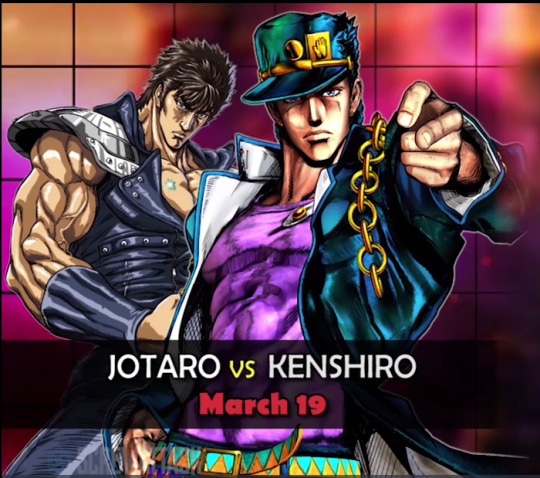
Is there a fight that you want me to review? - Send an ask/request, and I’ll look into it!
Do you want to read my fanfic based around DEATH BATTLE itself? click here!
Thank you for reading, and I hope to see you next time for…
Uh… I don’t have a clever name or quip for this one.
5 notes
·
View notes
Text
SB Nation Reviews: The Skyhook
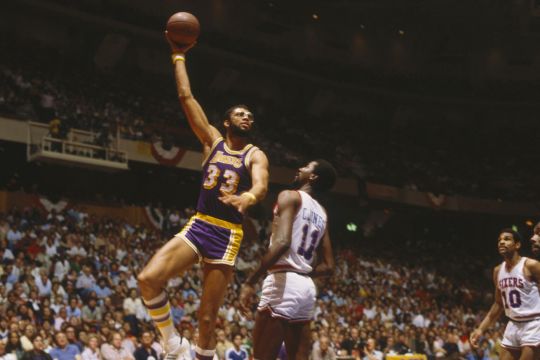
Photo by Focus on Sport via Getty Images
PERFORMANCE: 9.7
STYLE: 8.9
OVERALL: 9.3
Kareem Abdul-Jabbar’s skyhook was unstoppable, even when you knew it was coming. Left leg sweeping across the lane, ready to root itself to the ground like a tree trunk. Right leg bending 90 degrees at the knee, suspended in mid-air. Right arm tucking behind the head before slowly unfurling straight in the air. Left arm raising to protect the inside of the ball ball, then sweeping down into your air space like a floating shield. The same thing, every damn time. And every time, the defense was hopeless.
PERFORMANCE: 9.7
We can’t pinpoint the exact percentage Abdul-Jabbar shot on his patented move, since his heyday predates the internet itself. Our best guess comes via one intrepid blogger named “LamarMatic” who tracked all of Abdul-Jabbar’s skyhooks from the 1983 playoffs. He played in 15 playoff games that season, including 10 against Hall of Fame centers Artis Gilmore and Moses Malone. The results: an even 50 percent on skyhooks while scoring 1.06 points per possession. (For comparison, only two teams scored at least a point per possession on post-up plays during the 2019-20 season). Those efficiency numbers seem like a conservative estimate for his entire body of work, given Abdul-Jabbar’s age (he was 35, the oldest player in the playoffs) and the quality of competition he faced.
youtube
Abdul-Jabbar claims nobody has ever blocked his skyhook head-on. “Maybe a few people got to it, coming to help where I couldn’t see them, but if I knew where someone was, that person was not going to block that shot, because I always got my body in between them and the ball before I released the ball, and it’s impossible to get to it,” Abdul-Jabbar told then-ESPN writer J.A. Adande. He’s wrong that nobody blocked the skyhook — here’s a clip of Wilt Chamberlain swatting the skyhook twice in one play, and here’s one of Ralph Sampson doing the deed — but he certainly captured the feeling any opponents had at the time. It felt unblockable, and there’s nothing more demoralizing than a move that has no defensive counter.
The most important reason the skyhook became unstoppable is also the most boring: Abdul-Jabbar is tall. He was listed at 7’2, but he played much bigger than that. When he fully extended his right arm and leaped into the air off his left foot, he could reach higher than any human ever could. He once told astrophysicist Neil deGrasse Tyson that his release point on the skyhook was “about 10 feet to 11 feet in the air.” That seems about right.
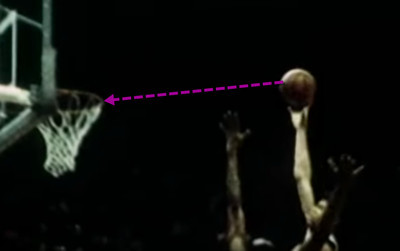
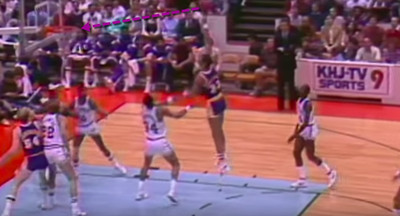
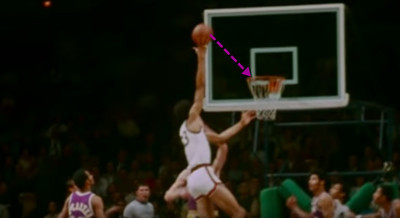
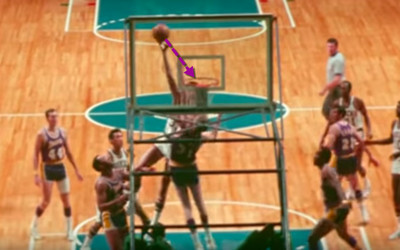
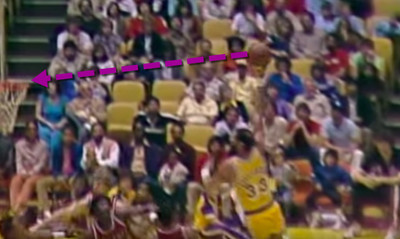
Crucially, Abdul-Jabbar still had the arm strength to give the shot some arc while spinning it off his middle and index fingers. That separates the skyhook from a more traditional jump hook, which tends to be shot on the way up and lacks the soft backspin of the skyhook. It’s easier to think of the skyhook as a one-handed, one-legged, sideways jump shot released at 11 feet, where nobody could block it.
Getting to that point was the key. As Abdul-Jabbar told Adande: “When you shoot it, you force people to wait for you to go up. And if they wait until I started to shoot it then they’d have to judge the distance and time it, and it’s gone before they can catch up to it.”
That all happens because of two other key elements of the move. The first is that wide lefty step across the lane, which creates that barrier between Abdul-Jabbar’s body and the defender. The best way to disrupt the hook is to force him to take that step backward and at an angle, throwing him off-balance. If you made that leg look like this, you had a chance.
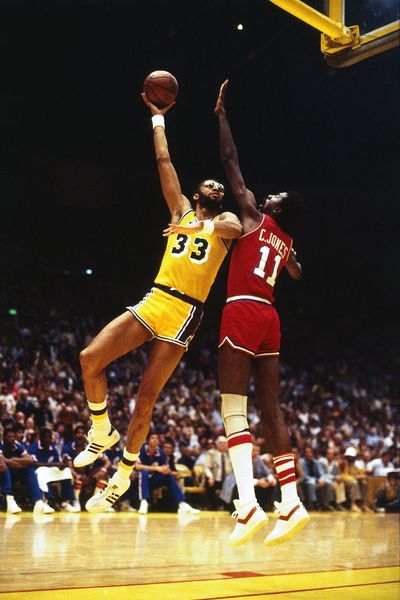
Photo by Rich Pilling/NBAE via Getty Images
But that rarely happened. Because Abdul-Jabbar made it a point to step through defenders instead of around them, his left leg stood straight up like an oak tree. They were stuck yielding him space, like so.

Or falling back when the full force of his weight ricocheted off their sides.
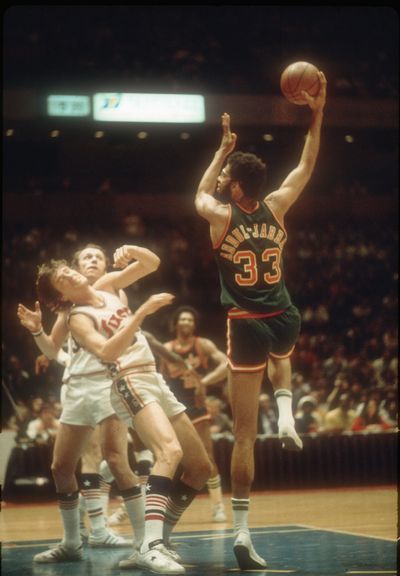
That leads us to the final hidden key of the skyhook’s effectiveness: that off arm. Say you do everything perfectly as a defender. You pushed Abdul-Jabbar out on the block. You didn’t let him easily use his left leg to power through you. You’re in his space as much as you possibly can be. Your arm is extended outward to alter the shot. Even if you do all that, you still have no chance to block the shot because Abdul-Jabbar’s other arm is sweeping downward to swipe you away.

Photo by Andrew D. Bernstein/NBAE via Getty Images
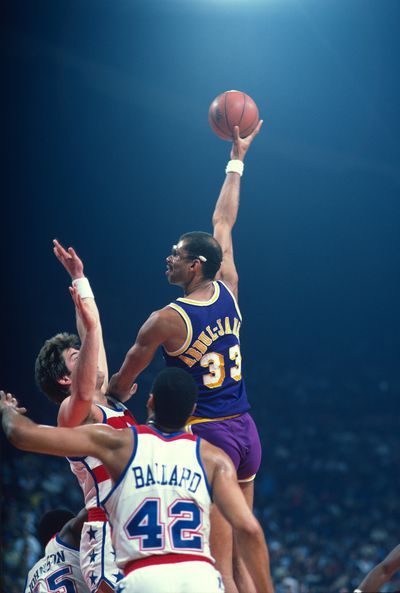
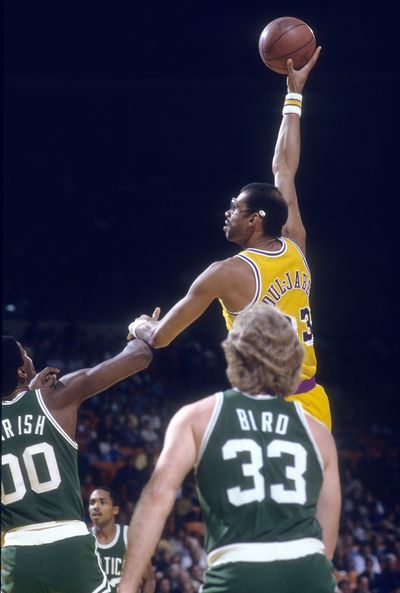
Photo by Focus on Sport/Getty Images
Abdul-Jabbar’s success in hiding that off-arm is the most underrated reason why the skyhook has faded into obscurity. Imagine Abdul-Jabbar replicating that very motion over and over in a world where any fan can slow down high-definition video and point out uncalled offensive fouls. Consider the uproar James Harden gets for his own foul hunting, especially on drives to the basket. That noise would be 10 times louder for Abdul-Jabbar’s skyhook. The league would legislate that motion out of the game with a snap of the finger.
That’s at least a more plausible explanation for the shot’s demise than the OK Boomer-style ones Abdul-Jabbar himself offers. At first, he blamed kids emulating high-flyers like Michael Jordan and Julius Erving. From a 1988 New York Times profile:
‘’One main reason is the kids growing up today all want to be like Michael Jordan and Dr. J and Dominique,’’ he said, referring to Julius Erving and Dominique Wilkins. ‘’They want to show great and obvious athletic ability and jump high and shoot jumpers and throw the ball down.’’
Nowadays, he redirects the same argument to different kinds of players.
youtube
“Everyone is so enamored with the three-point shot. So the kids, they don’t want two points. They don’t want to work with their back to the basket. That’s not cool. They want to go out there in the stratosphere and shoot three-pointers.”
Has Abdul-Jabbar ever considered that the reason people don’t shoot hook shots anymore isn’t because it’s not cool, but because it’s impossible for anyone else to put together all the elements necessary to make it a great shot? Speaking of ...
STYLE: 8.9
I’ve never understood the argument that the skyhook isn’t cool. Are these people out of their minds?
Interviews with a half-dozen coaches revealed many of the same answers. The game has changed. It’s a tough shot to learn. It’s not cool. “Teams just don’t walk it up and drop it in the post anymore,” said Pelicans coach Alvin Gentry. Added Thunder assistant coach Mark Bryant: “You aren’t going to get any commercials shooting the skyhook. Only [Kareem] got commercials shooting the skyhook.”
[...]
“The kids don’t like doing it,” Bryant said, laughing. “It kind of boils down to that.”
Lest you think it’s just a few grumpy coaches, even Shaquille O’Neal admitted his generation “likes to be a lot cooler.”
Which hook shot do you think looks cooler? This ...

Or this?

Which shot do you try more when shooting around? It sure as hell ain’t O’Neal’s.
Abdul-Jabbar’s even has an incredible name: skyhook. That’s the term Bucks broadcaster Eddie Doucette used to describe the iconic shot Abdul-Jabbar made to win Game 6 of the 1974 NBA Finals.
youtube
It’s a bit misleading to say that moment was the first usage of the term, as is legend. There’s audio of Doucette using it all the way back in 1970, and you can also hear Pat Summerall (yes, that Pat Summerall), saying “The sky hook is good!” on the TV call. Regardless, read Doucette’s explanation for how he coined the term and tell me this doesn’t sound dope as hell. (Emphasis mine):
“When he went to that baseline and went up for that shot, it was kind of almost eye level with me,” Doucette said. “It felt that way. Everything became slow-motion when he went up for that shot on the baseline. Took it in stride. Went up off his left leg. Perfect balance. Right hand fully extended. Ball on the fingertips. Launched that shot. And as he launched it, it just hit me. ‘That ball is coming out of the sky. That’s a skyhook.’ That’s how it happened. I never gave it any thought. But I had to be in a position where I was located that would inspire me to think that it would be coming out of the sky.”
The idea that the skyhook isn’t cool, then, never sat with me. The real issue is Abdul-Jabbar wasn’t considered cool, not the shot itself. The shot itself is a thing of beauty. As Oscar Robertson once said, ‘’It’s almost a ballet-type shot. There’s so much rhythm and balance in it. It’s almost like a pirouette.”
I’m more sympathetic to the idea that the skyhook isn’t as “macho,” to use Abdul-Jabbar’s words, as a slam dunk or a power move. The idea that one can perfect the skyhook if they just devoted enough attention to it cuts two ways. The shot may look beautiful, but a supremely athletic and strong dude might feel that he doesn’t need to resort to such tricks to do his thing.
This is the same phenomenon that explains why several all-time greats and peers were slow to accept Stephen Curry’s brilliance even as the masses quickly embraced him. His technique was impeccable, but his physical stature seemed ordinary. He didn’t look the part of a superhero. He was no giant.
Like Curry, Abdul-Jabbar’s signature move was to shoot over defenders, not shove them out of the way. But unlike Curry, Abdul-Jabbar did seem like a giant compared to everyone else. Perhaps it would have been more “macho” if he used that physical advantage to plow through his opponents rather than use finesse to succeed. Maybe that’s what O’Neal and others mean when they suggest the skyhook isn’t “cool.”
But if that’s how NBA players really define “cool,” consider me the opposite of Miles Davis. If NBA players could look this iconic shooting a hook shot, I think they’d all do it.
OVERALL: 9.3
Basketball is a technical sport, not a physical one. The best players look like artists and dancers, not boulders. Even Zion Williamson defies our imaginations because of his agility at his size, not because of his body type.
So let this be a call to give the skyhook more love. Instead of grumbling that nobody uses it anymore, let’s appreciate how lucky we were that Abdul-Jabbar made it look so flawless.
0 notes
Text
LSAT Prep FAQs
You have questions, we all do. Especially if you’re preparing for the LSAT. The LSAT makes naive fawns of us all, as we take our first timid steps into some LSAT prep program. So you have some questions about how to prepare for the LSAT, or how to make the most of one of our prep programs. Now, some of your questions are so common that they become “frequently asked questions.” And we have a pretty robust FAQs section on our website, both for prospective and current students. Today’s blog will address some of the less common, but still fairly common, questions we didn’t have a chance to address on our site. Call this our FEAQs (Frequently Enough Asked Questions).
1. Should I take notes while watching videos for an online LSAT course?
This is a question that’s been coming over our transom quite a bit. Many LSAT prep programs have placed a greater emphasis on online courses recently, both to account for the new(-ish)ly digital LSAT and students’ busy lives and aversion to long commutes. For students whose academic careers took place exclusively in classrooms, watching live recorded lessons or on-demand lesson videos at home could feel a bit like a strange new learning environment. And, perhaps as a result, many are unsure whether they should even take notes while watching these videos. So, they ask, “Should I take notes while watching these online videos?”
We recommend using whatever technique you used successfully in other, more traditional learning environments. For many of us, we take notes to keep engaged, get all the important parts of the lesson in writing, and confirm that we understand what the instructor is even talking about us. For others, we sit there and let the words of lesson wash over us, confident that we’ll be able to remember the important bits later. So use your preferred technique if you go with online LSAT prep. The pedagogy — fancy word for “teaching methods,” if you’d like to jot down a note and use that later — of online prep isn’t much different than that of a classroom course. So whatever worked for you in a classroom will also work in an online course.
That said, for the LSAT, we strongly recommend taking notes, whether the class is in person or online. Improving on the LSAT involves learning a few important concepts and practicing a few sound strategies, both of which will help you answer any LSAT question. Most people need to take notes on what these concepts and strategies entail to effectively employ them in their practice outside of the lessons. Our on-demand lesson videos, by the way, use on-screen text to make very clear what notes you should be taking down. You can get a sneak peak at these videos by signing up for a free trial here.
2. Will I do better if I do a traditional in-person classroom course?
Here’s another one we get about online prep a lot. Many people considering taking either our live online or on-demand online courses are concerned that they may not increase their LSAT score as dramatically as they would had they taken our in-person course. So do students do better in an in-person classroom course?
We’ve monitored — and we continue to monitor — the success of our students in all of our courses, whether in person or online. It’s a lot of data to process. But the long and short of it is that students who take the in-person class do not outperform students in our other courses. Which we didn’t find too surprising. Our in-person instructors are amazing, and so our our live online instructors. Our online classes cover the same exact material as our in-person classes. Our live online course allows you to ask your instructor questions in real time, just as you could in class. And the on-demand lesson videos let you pause, rewind, and rewatch lessons to get a more thorough understanding of the material.
And, having crunched the numbers, we found the biggest predictor of dramatic score increases was student engagement. The more LSAT questions you can complete during the course, the better chance you have make a huge score leap. And all three of our courses — our in-person, live online, and on-demand online course — will give you access to every LSAT question ever published.
3. How far in advance should I start prepping for the LSAT?
No matter how people choose to study for the LSAT, we hear a lot of questions about how long the study process should take. For most people, studying for the LSAT is a two-to-four-month endeavor. That’s why we made most of our classes run for two to four months.
But it all depends. Some people who are trying to make a minor score leap can get away for studying for a month. Some people trying to make a huge score jump might take longer than four months.
We recommend starting your studies with a practice exam. Go into that practice exam completely cold. The score you receive, and how close or far that score is from the score you’d like to receive on the actual exam, will give you a sense of how long you’ll need to study. If you don’t know what score you’d like to eventually receive on the real LSAT, but have a good idea of where you’d like to go to law school, check out our Law School Compass, which you can get in our free LSAT Toolkit. For those who might need a study plan that’s either longer or shorter than the typical two-to-four-month duration, we strongly recommend our online anytime course, which allows you to customize your study plan to make it as long or as short as you’d like.
4. Do I really need to do daily homework and drills?
We’ll make this answer short. Yes.
Now here’s a longer version of that answer. Absolutely yes. Unequivocally yes.
Remember, when we said the students who do the most questions give themselves the best shot at making a major score increase? The daily homework is how you’ll do more of those questions. And remember when we said that improving on the LSAT also involves learning a few important concepts and practicing a few sound strategies? The drills, which are part of Blueprint’s homework curriculum, is where you’ll confirm that you understand those concepts and strategies.
5. What if my first practice exam score is really low?
Well, first of all, we’re relativists at Blueprint. We don’t think there’s any such thing as a “low” practice exam score. Your score is either relatively close to the score you eventually want to get on the real test, or it’s relatively far away from the score you eventually want to get on the real test. This may feel like a distinction without a difference to you, but we’ve found that getting rid of inherently negative, self-defeating terms like “low” or “bad” when discussing your LSAT performance can go a long way in making the experience of studying for the LSAT less self-esteem destroying.
As we alluded to earlier, if your first practice exam score is far away from the score you’d eventually like to eventually receive, you may need to adjust your study plan. There are a few very important checkpoints you’ll have to reach during your studies. Learning the strategies backwards and forwards is going to be super important to your progress. Taking the time to slowly and incrementally speed up will be another crucial step. And then the last step will involve taking many practice exams to practice testing strategies and monitor the areas you still need to review. These things take time — they certainly can be accomplished in a two-to-four month period, but they may take a little longer.
If you’ve taken a practice exam and want to develop a plan of attack for yourself, you can schedule a time to speak with one of our experienced Academic Managers here.
6. If LSAC is promoting Khan Academy, does that mean it’s the best way to prep for the LSAT?
The Law School Admissions Council — LSAC for short, they write and administer the LSAT — partnered with Khan Academy to create a free online LSAT prep program. They launched the program in June of 2018. And they continue to promote the program — there’ll even be a link to the program available to you when you register for the LSAT.
Since Khan Academy is being promoted as the “Official” LSAT prep program from the sacrosanct halls of the Law School Admissions Council, some have the impression that it’s the best way to prepare for the LSAT. That the Khan Academy is where the test writers divulged all the secrets to mastering the LSAT. Is that the case?
Well, it’s very difficult — perhaps impossible — for me to give an unbiased answer. But I can say with total confidence that the Khan Academy is not where LSAC divulged all the secrets to mastering the LSAT. I can say that because there are no such secrets. Mastering the LSAT, as we’ve said, involves learning, developing, and refining a series of skills and strategies. There isn’t a secret cheat code that can be revealed, unfortunately for us all.
I can also speak a little bit about my experience with Khan Academy. When it launched, I made an account and tried it out. Overall, I felt that it definitely had some pros, but also some … Khans (very sorry). It had me start with a practice exam — as any prep program worth its salt should — and I arbitrarily answered some questions correctly and some incorrectly. After the test, the program had a few suggestions for where I should begin my studies. Given my score, I needed a lot of help. But Khan Academy recommended I prioritize learning how to do “Role questions.” Your performance Role questions will account for about 1-2% of your overall LSAT score, so I wasn’t sure why this should be my priority. You can’t make a huge improvement to your LSAT score simply by mastering Role questions, so I felt this suggestion could be misleading to some students.
If you didn’t want to follow its suggestions, Khan Academy also presented a comprehensive course that takes you from the basics of the LSAT to its more advanced elements. There were text and video explanations for most parts of the LSAT. Some of these explanations had great pointers; others provided pointers I really didn’t think were helpful. All of it seemed a little bare bones and … I don’t want to say boring, so I will say a kinder word than boring … dry.
Overall, I think the availability of free LSAT prep is an important and necessary part of this LSAT industry. I’ve spilled thousands upon thousands of words that provided free LSAT advice on this blog — I feel strongly about providing a little free LSAT help to the public. But is Khan Academy the best way to prep for the LSAT? We’d encourage you to check it out and compare it to the other programs on the market, and make your own decision.
LSAT Prep FAQs was originally published on Blueprint LSAT Blog
0 notes